OVERVIEW OF HEZBUT TAWHEED
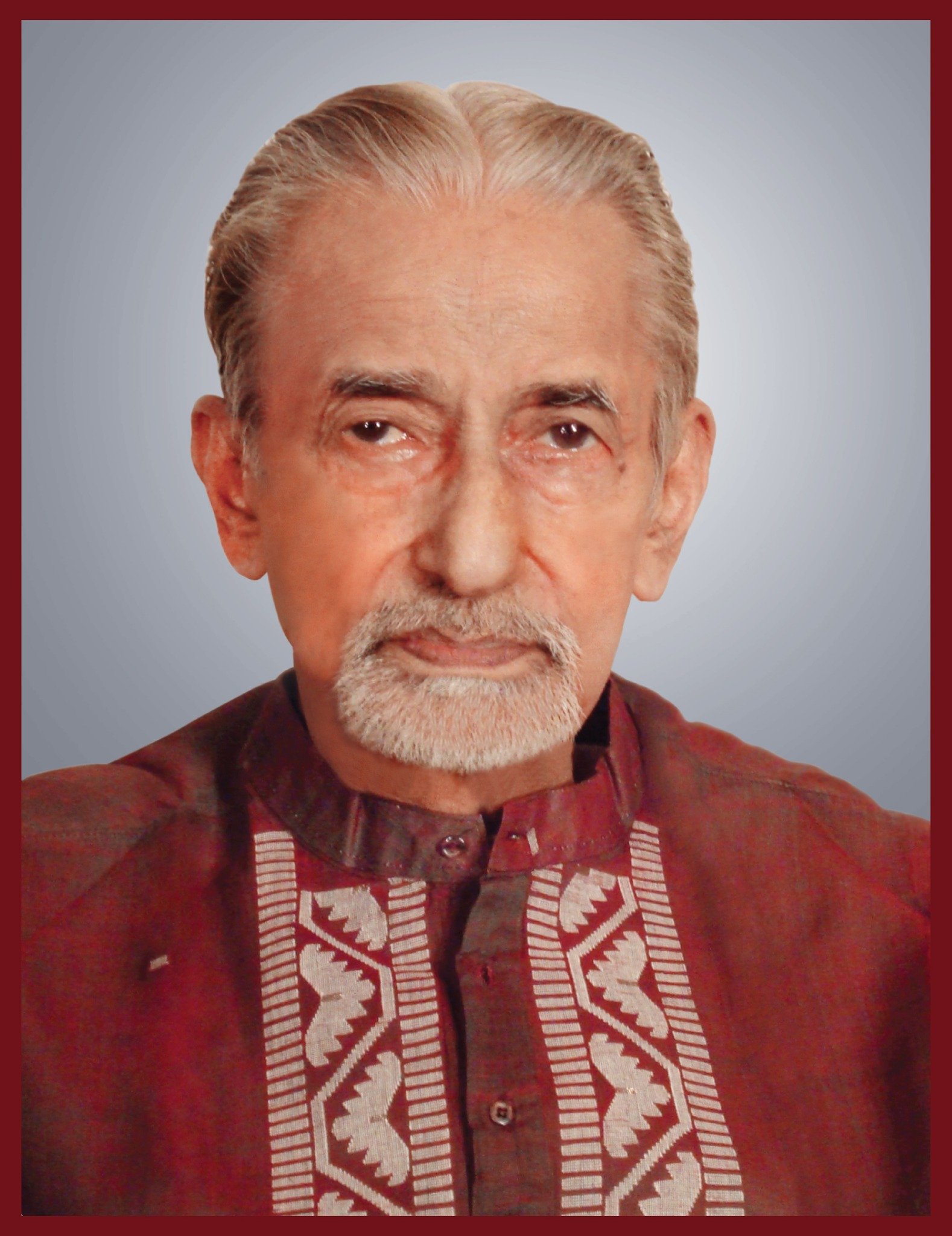
Mohammad Bayazeed Khan Panni
Honorable Emamuzzaman, the founder of Hezbut Tawheed
Introduction of Hezbut Tawheed?
Hezbut Tawheed is a non-political religious reform movement. The name "Hezbut Tawheed" translates to "The Party of the Sovereignty of Allah." We believe that Almighty Allah is the ultimate source of truth and justice. Therefore, in addressing any problem in human life, decisions should be based solely on the commands and principles of the Creator.
Objective of Hezbut Tawheed
To establish global peace by eradicating all forms of injustice and oppression through the implementation of Allah's divine guidance in every aspect of human life.
Establishment of Hezbut Tawheed
Hezbut Tawheed was founded on February 16, 1995, by Mohammad Bayazeed Khan Panni, a descendant of the esteemed Panni family of Karatia, Tangail, Bangladesh.
The Founder of Hezbut Tawheed
The position of the highest leader of Hezbut Tawheed is 'Emam'. The founder of Hezbut Tawheed is called Emamuzzaman. Emamuzzaman Mohammad Bayazeed Khan Panni (March 11, 1925 – January 16, 2012) was born in Tangail, British India. He was born into one of the most prestigious princely families, later known as zamindar families of Bengal. His ancestors traced their lineage to the historic sultans of the Karrani Dynasty. His character embodied a remarkable blend of spiritual and worldly qualities, making him a symbol of truth and integrity.
Although widely known as the founder of the Hezbut Tawheed movement, he was a man of versatile genious. He excelled as an athlete, sportsman, rifle shooter, and a formidable hunter. His book on hunting fierce animals was included in the academic curriculum. He also played a significant role in the anti-British movement. During the Pakistan era, he was elected to the Provincial Legislative Assembly. Professionally, as a homeopath, he revolutionized this field of medicine and contributed to the establishment of a college offering a bachelor's degree in homeopathy. Additionally, he founded a maternity and child hospital, as well as a charitable organization for special needs children. He was also a founding member of the government cultural and research institution, Nazrul Institute.
From an early age, he observed that the Muslim community worldwide was subjected to subjugation, humiliation, and persecution. They themselves were fragmented into countless divisions—religiously, politically, and geographically. They are afflicted by various forms of mental stagnation, including ignorance, lack of scientific knowledge, sectarianism, fundamentalism, misogyny, and religious fanaticism. He identified the root cause of the Muslim nation's dire situation and, to provide a path to liberation, authored a book titled "This Islam is Not Islam at All" after 17 years of dedicated effort. Due to his uncompromising stance against the misuse of religion and extremism, he endured significant persecution and suffering.
The Current Leader of Hezbut Tawheed
The current leader (Imam) of Hezbut Tawheed, Hossain Mohammad Salim, was born on November 28, 1972, into a respected Muslim family in Porkara village, Sonaimuri, Noakhali
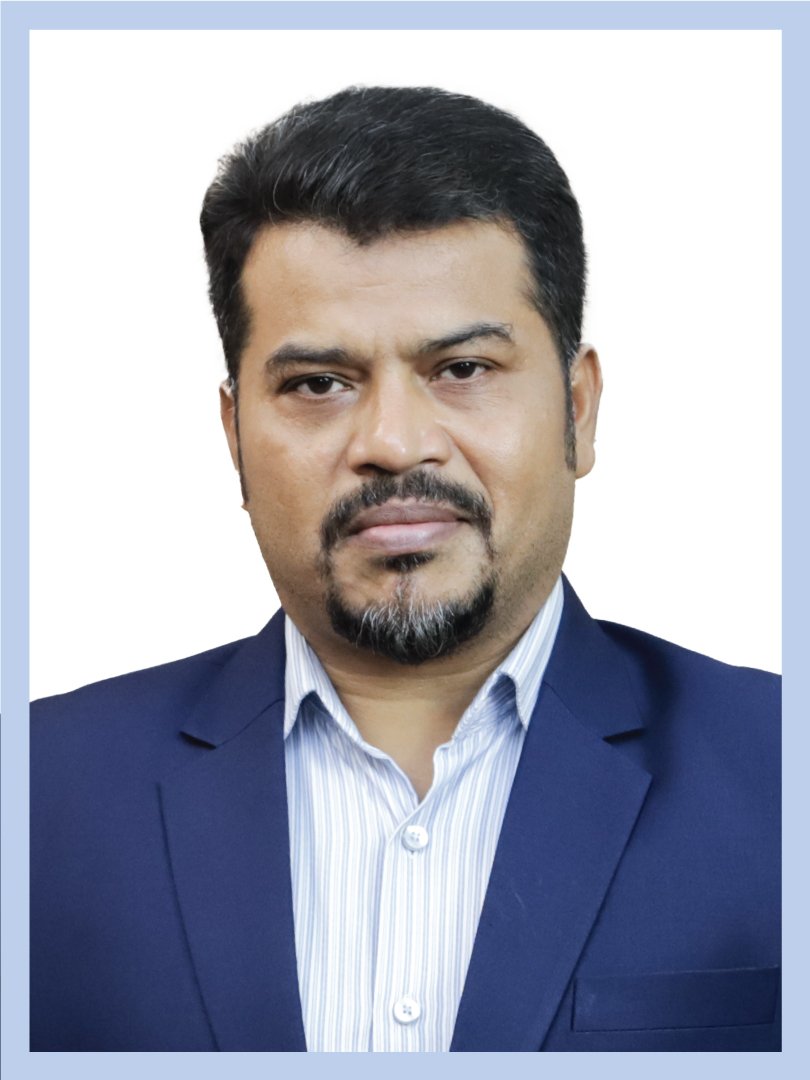
The current leader (Imam) of Hezbut Tawheed
district, Bangladesh. His academic journey was marked by excellence; in 1993, he achieved first place in the nation in the BSS (Bachelor in Social Science) examination. He later earned a Master's degree in Political Science from Jagannath University. During his student years, he was actively involved in various religious, social, and political activities.
In 1999, Hossain Mohammad Salim came into contact with the founder of Hezbut Tawheed, Emamuzzaman Mohammad Bayazeed Khan Panni, and subsequently joined the movement. His organizational skills, eloquence, courage, and dedication quickly earned him the trust of Emamuzzaman. Over the next twelve years, he served as a campaign commander and coordinator. Following the founder’s passing in 2012, the significant responsibility of leadership was entrusted to Mr. Salim. Under his guidance, the movement has grown into a strong ideological force opposing extremism, sectarianism, political apathy, bigotry, misogyny, indecent culture, Islamophobia, and inconsistencies within the established social system.
Mr. Salim's work spans various fields. He oversees multiple print, electronic, and online media platforms, including two newspapers: Daily Desherpatra and Daily Bajrashakti. He advocates for Islam as a "real solution to real problems" through his articles and has authored several books. In his village, he has spearheaded over fifty development projects, including schools, mosques, industries, agricultural ventures, cattle farms, fish farms, and small businesses. Additionally, he has nurtured the growth of more than fifty sports and cultural organizations. Despite facing multiple attacks, looting, and arson at his home—incidents that also resulted in the brutal murder of two members—Mr. Salim remains steadfast. He continues to advance the true principles of Islam while promoting extensive social reform and development activities.
CORE MESSAGES OF THE MOVEMENT
1. The Call to a System of Life Based on the Sovereignty of Allah
Every system of life has a sovereign authority, known in Arabic as “Ilah.” The foundation of Islam is Tawheed—accepting only Allah as the Ilah or sovereign authority. The Messenger of Allah united the Arab nation, which was immersed in the darkness of ignorance and engaged in internal
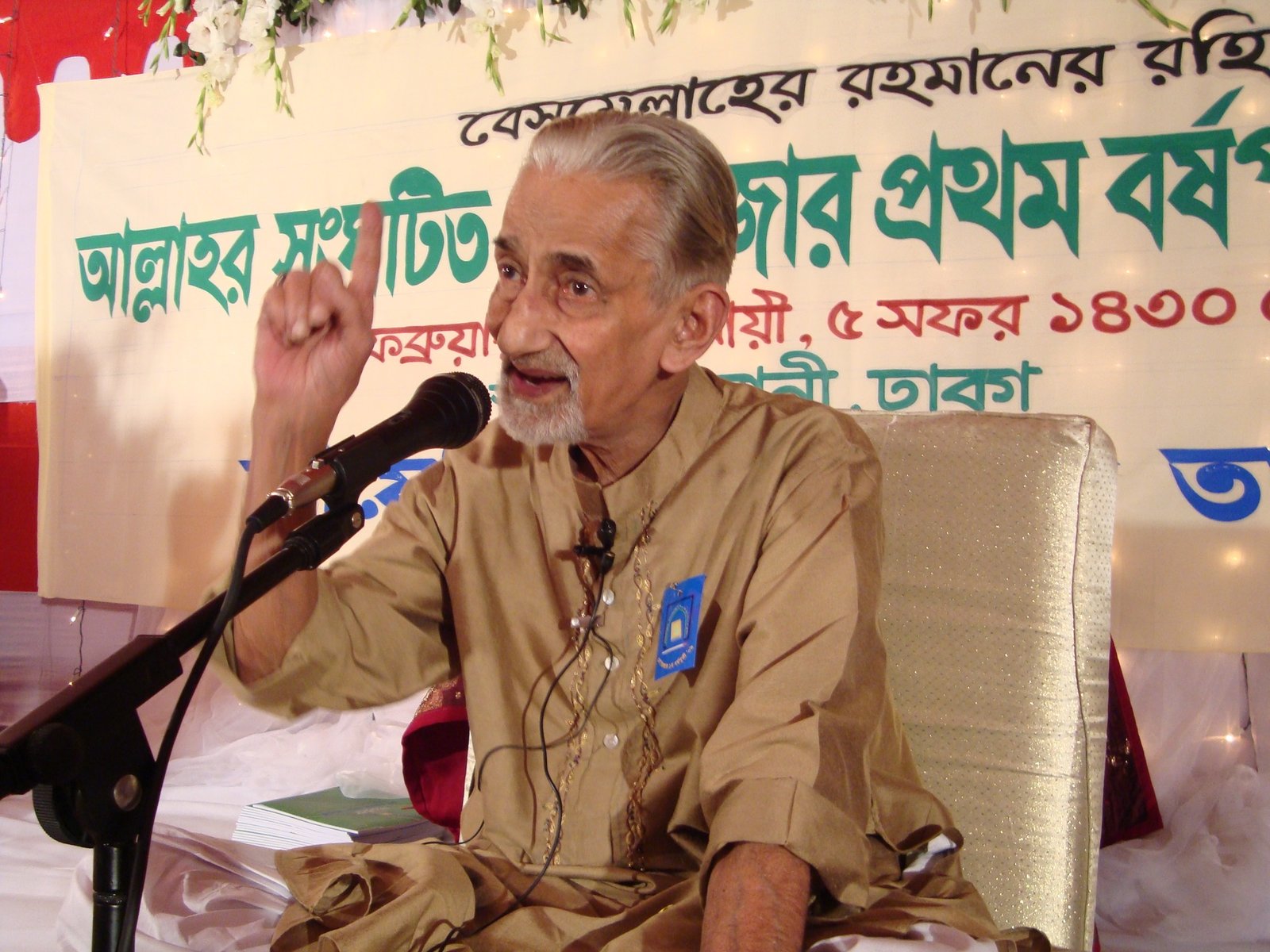
had strayed from the core principle of Islam, Tawheed (the sovereignty of Allah).
He urged humanity to reunite based on this fundamental concept.
(February 2, 2009, Banani, Dhaka)
conflicts, with this single message. They resolved to obey the commands of Allah. As a result, the previously disregarded Arab nation transformed into the most powerful, prosperous, and intellectually advanced nation in the world, establishing unparalleled peace, justice, and fairness across half the world.
However, over time, they deviated from their ideals and became divided into numerous factions. Consequently, they were defeated by other nations. Meanwhile, various secular materialistic ideologies and ways of life were tested and experimented with throughout the world. Yet, no system has brought peace to the world. Technological advancements are progressing, but this technology is often applied against humanity. We believe that without adopting the life system created by Allah, peace will not come to the world. Therefore, we call upon the Muslim nation and all of humanity to acknowledge Allah, the Creator, as the sole sovereign authority and lawgiver.
2. Ideological war to eradicate extremism
We have gathered evidence that the current version of Islamic militancy violates the essential teachings of Islam. This terrorist ideology was created through deliberate misinterpretations. Because some people are engaging in extreme activities motivated by religious beliefs, it cannot be dealt only with force. The more force is used, the more careless they become. As a result, in addition to utilizing force, what is required to remove extremism is a counter-ideology that will refute their assertions and prove them incorrect.
3. The Prohibition of Commercializing Islam
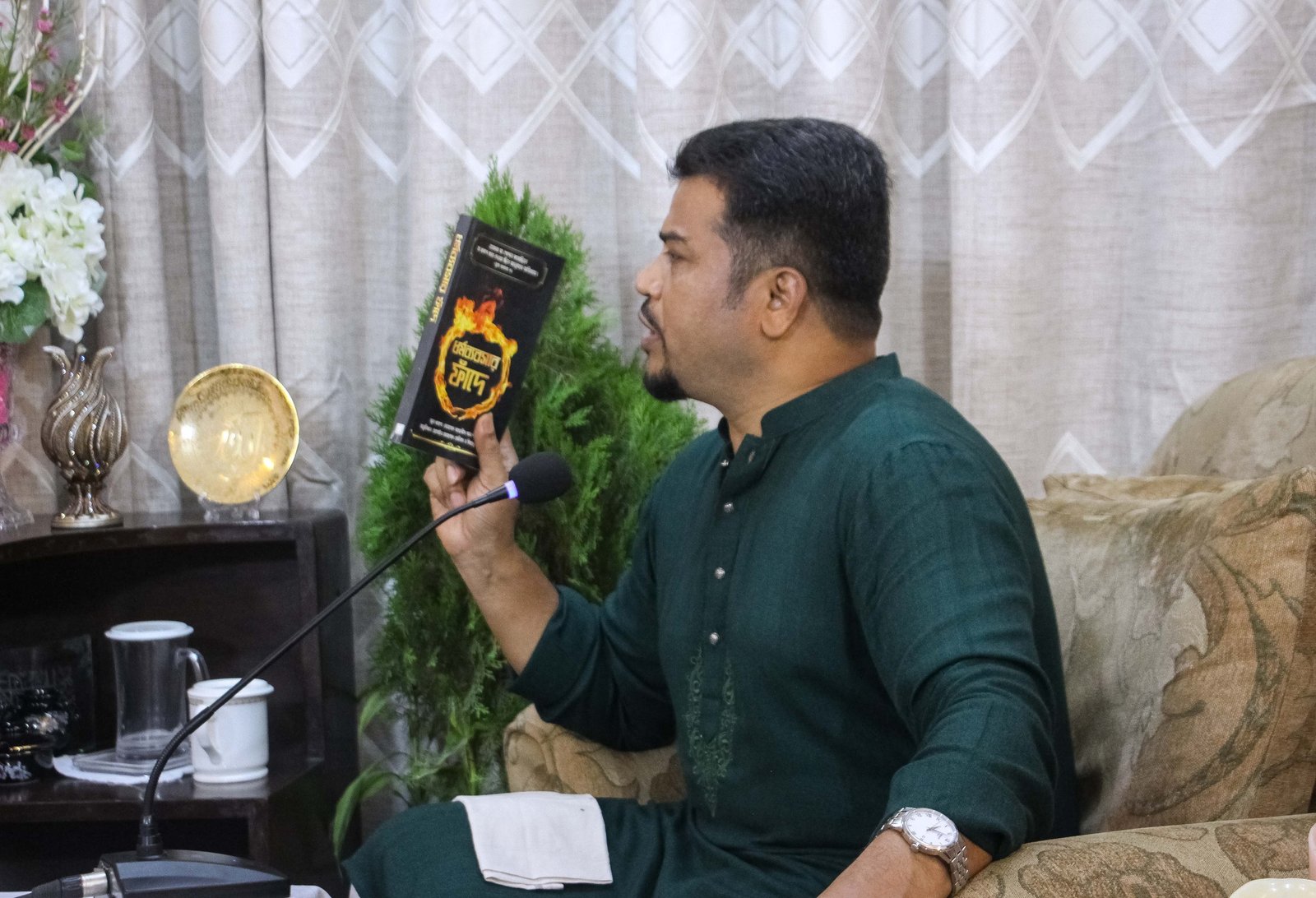
eradicate militancy. To this end, they organized thousands of public meetings,
seminars, and processions. In the picture, the Imam of Hezbut Tawheed leads
a rally in Panthapath, Dhaka. (August 9, 2016)
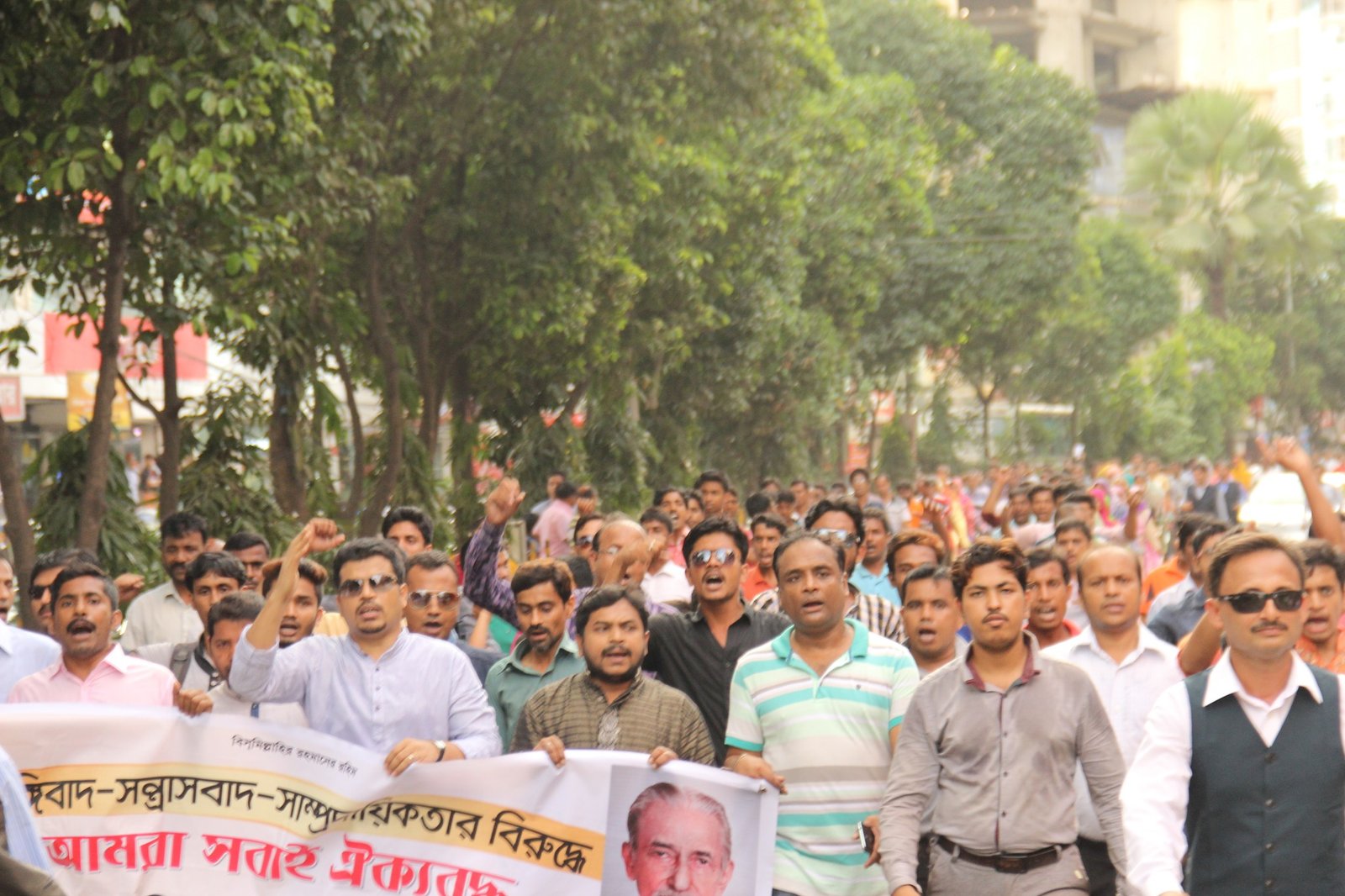
eradicate militancy. To this end, they organized thousands of public meetings,
seminars, and processions. In the picture, the Imam of Hezbut Tawheed leads
a rally in Panthapath, Dhaka. (August 9, 2016)
Islam, as a comprehensive way of life, serves as a divine guide for creating a harmonious and peaceful world. However, there exists a certain group that exploits
religious knowledge and manipulates people’s spiritual sentiments solely for their own financial gain. They engage in corrupt politics and wield religion as a tool to further sectarian interests and perpetuate oppression.
We have ample evidence that transforming Islam into a commercial commodity or using it for personal profit is unequivocally forbidden (haram). Throughout history, none of the Messengers of Allah resorted to leveraging religion as a means of livelihood. Why? Because when personal interests intertwine with matters of faith, the purity of religion becomes distorted, and its noble purpose—serving humanity—gets compromised.
4. A Blueprint for Interfaith Harmony
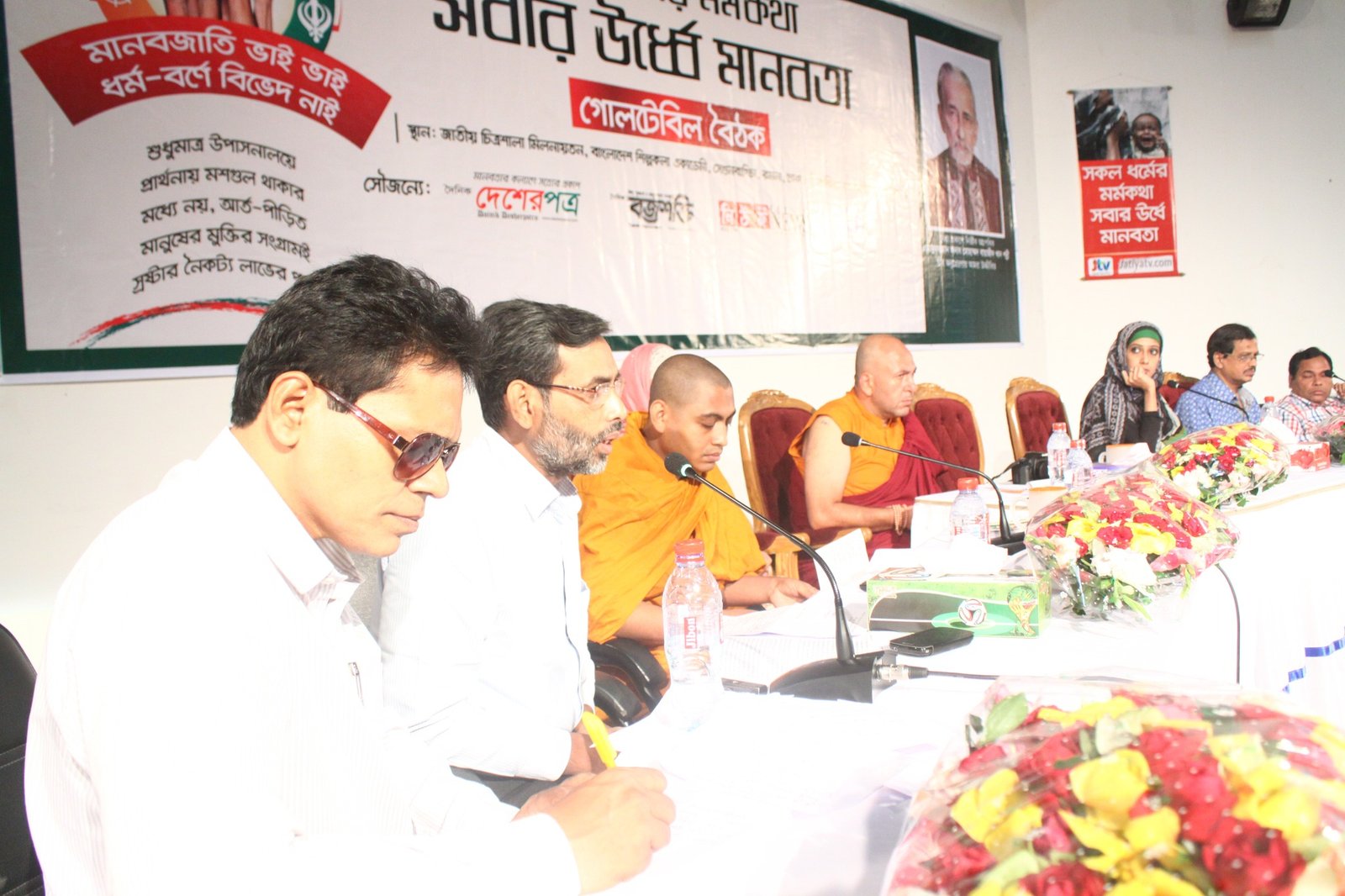
misinterpretation by some has caused discord. Hezbut Tawheed promotes
interfaith harmony to unite all religions and foster global peace.
A seminar on this was held at Shilpakala Academy, Dhaka. (October 21, 2014)
In our quest for unity, we hold a simple truth: the Creator of humanity remains singular, regardless of the various names attributed. Throughout history, Messengers and religious leaders have consistently urged us to recognize this one Creator as the ultimate authority.
Yet, over time, misunderstandings crept in, leading to the emergence of countless religious factions. Political factors further strained relations among these groups. Amidst it all, we’ve lost sight of our genuine selves.
Consider this: Hindus, Muslims, Buddhists, and Christians—regardless of ethnicity or nationality—share a common lineage. Our roots trace back to the same primal ancestors, Adam and Eve. As Hezbut Tawheed, we emphasize the urgent need to dismantle communal barriers and nurture global brotherhood based on this shared identity.
5. The Position of Women in Society
We believe that Islam does not hinder women's progress, freedom, or empowerment. Islam grants women the right and encouragement to participate in all
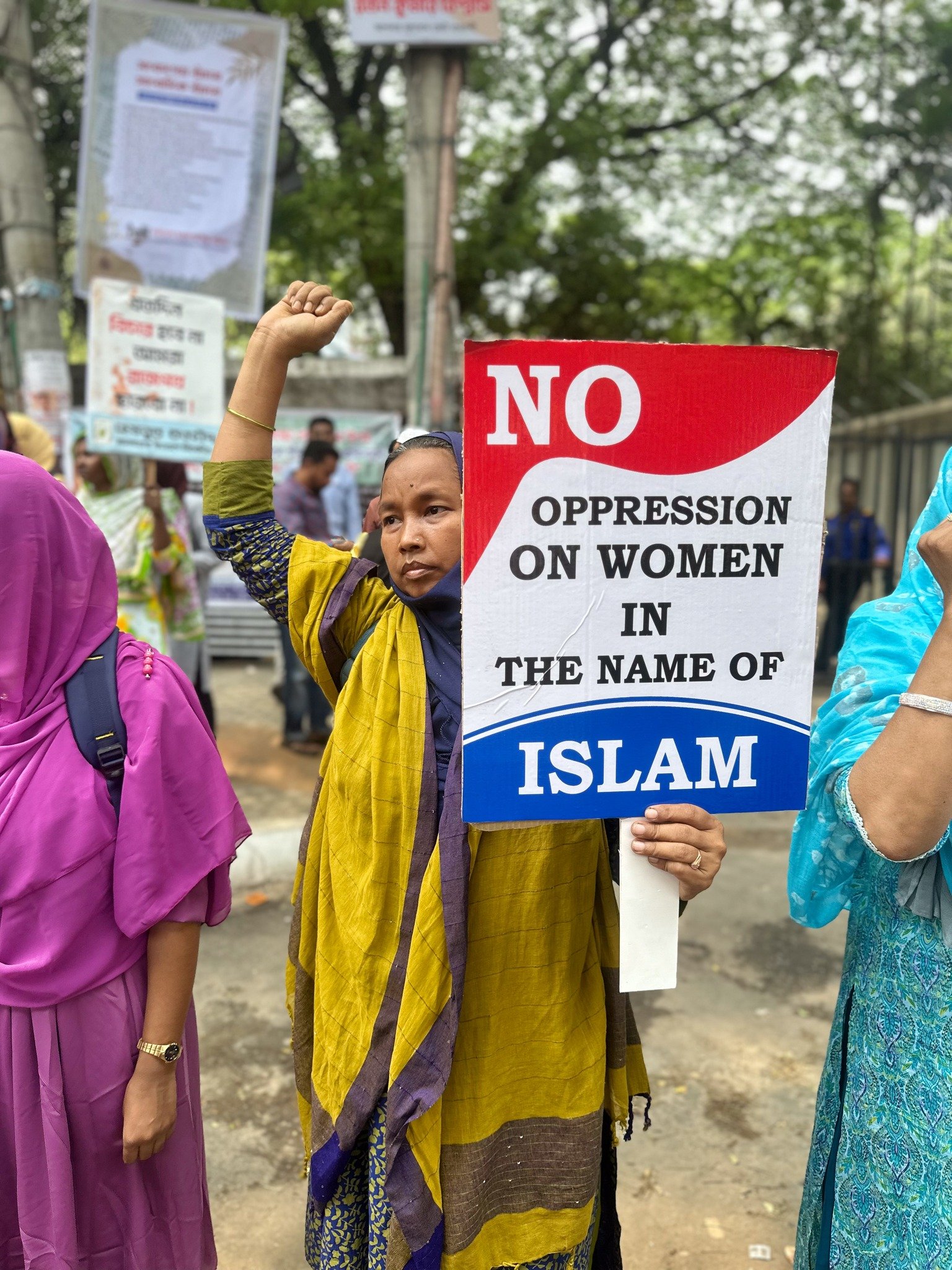
tions have led to their oppression and deprivation of freedom.
Hezbut Tawheed actively speaks out against this misuse.
On May 12, 2024, at the National Press Club in Dhaka,
Hezbut Tawheed organized a women's human chain
and protest march in response to attacks by misogynist
fanatics on their female members.
aspects of life. During the time of Rasul'Allah (PBUH), women attended mosques, participated in Friday prayers and Eid gatherings, and played vital roles in caring for the wounded, managing the market, and even on the battlefield.
However, the misinterpretation and excessive enforcement of the dress code have led to their oppression and regression. By highlighting the true essence of Islam, we aim to bring to light the rights and contributions of women during the time of the Messenger of Allah, Mohammad (PBUH), as outlined in the Quran, the teachings of Rasul'Allah, and historical evidence. The women in our movement also play a crucial role in all activities, working alongside men while maintaining modesty.
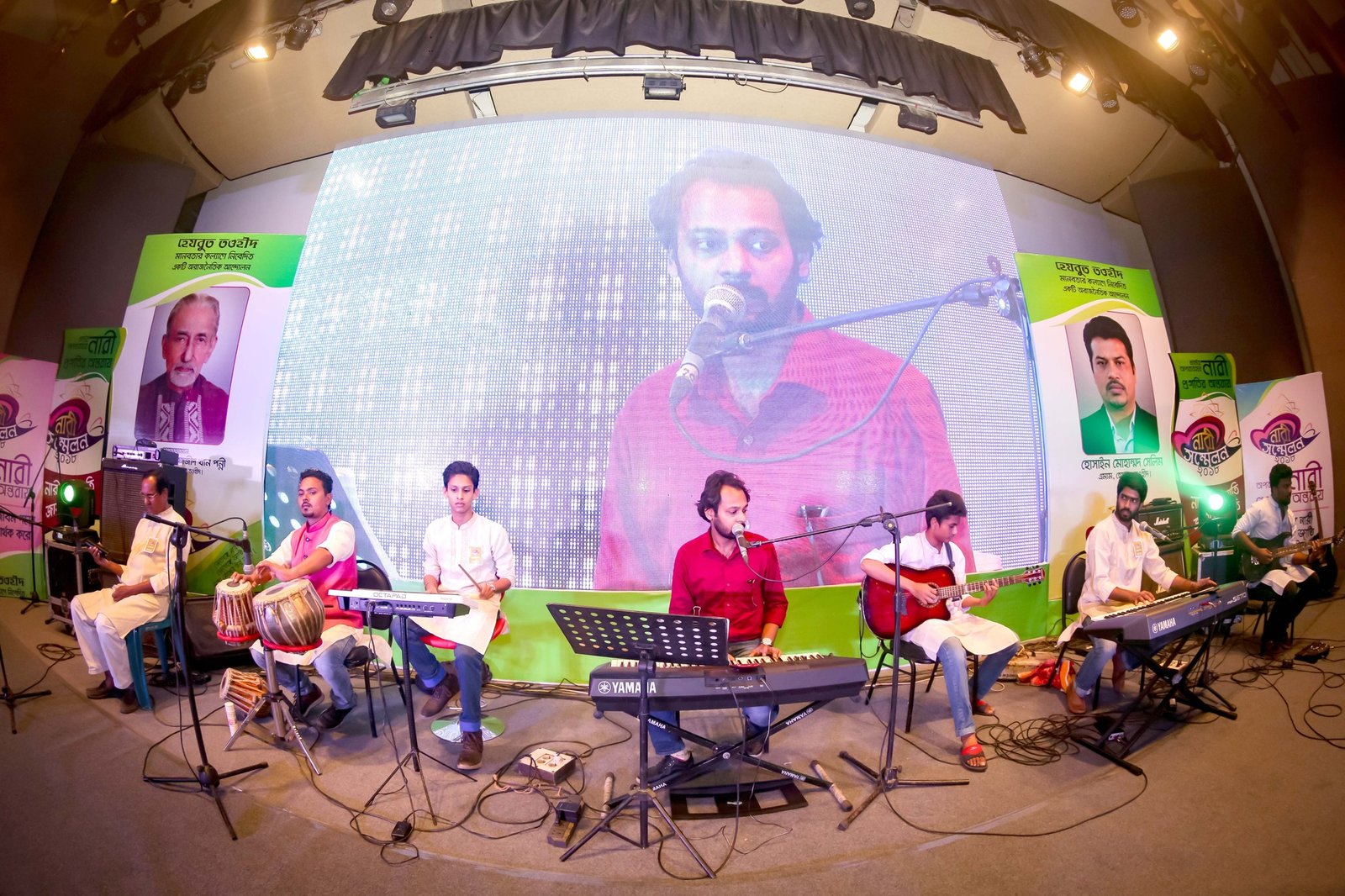
Hezbut Tawheed's cultural wing organize cultural events across
the country to raise awareness against extremism. On November 6, 2018,
they performed at a Women's Conference in Dhaka.
6. Art and Culture in Islam
Islam is a universal way of life, with cultural engagement deeply embedded within its framework. It embraces the rich diversity of human cultures and does not seek to impose Arabian norms on other regions. The core principle Allah has provided is the prohibition of immorality, falsehood, and disobedience to Him (Surah Al-A'raf 33). Yet, a prevalent misconception among some in the Muslim community is that Islam wholly forbids the practice of regional cultures and festivals, including music, painting, and sculpture. This misunderstanding has led extremist groups to attack cultural events and monuments. To address these fallacies, we have fostered a vibrant, humanitarian-driven cultural movement. We assert that cultural activities play a crucial role in raising consciousness and combating all forms of injustice.
7. Sports in Islamic Perspective
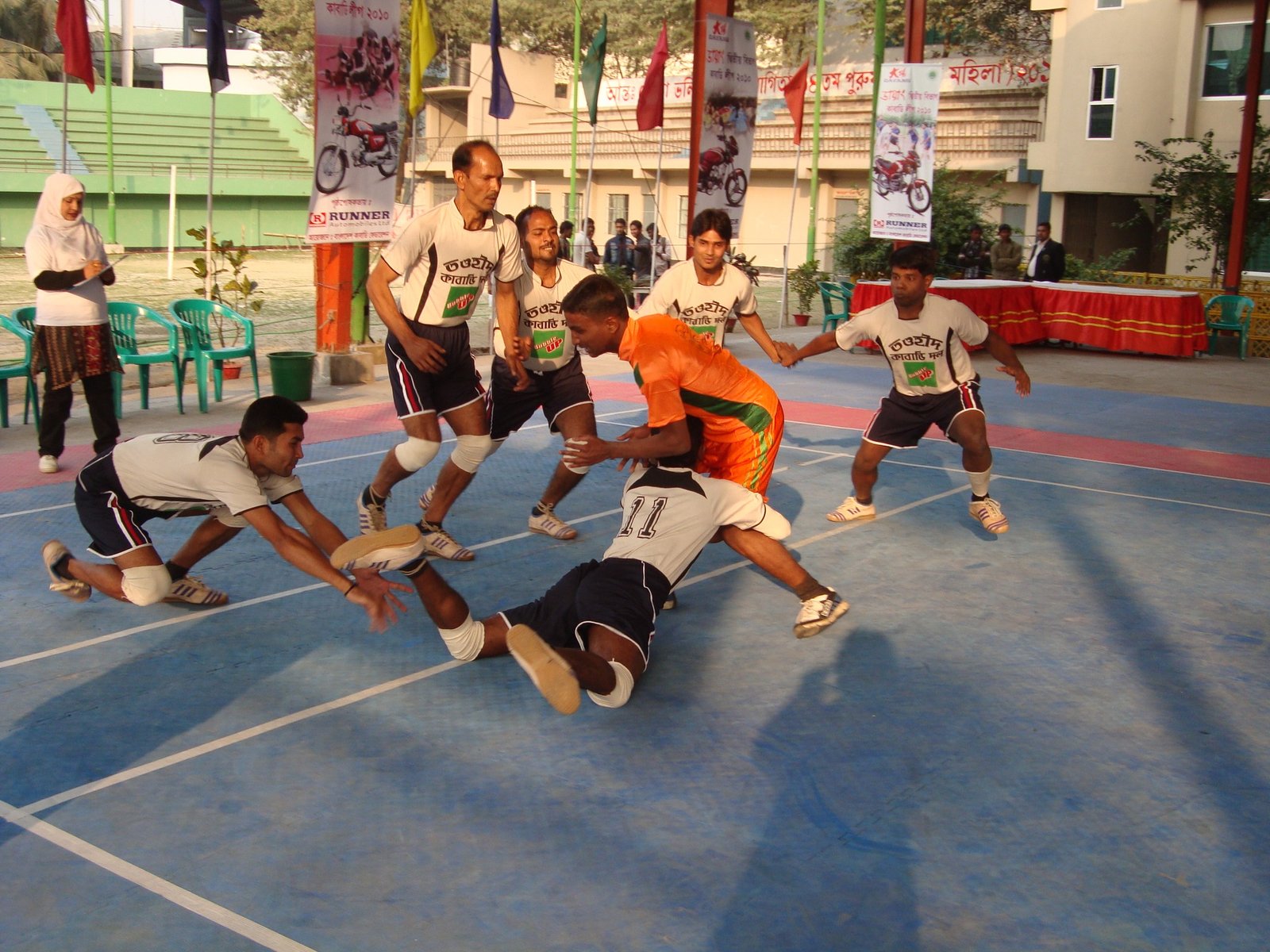
annual tournaments in football, kabaddi, badminton, and marathons.
The picture shows Hezbut Tawheed members competing in the
Dayang Second Division Kabaddi League 2010 at the National Kabaddi Stadium.
Today, sports are often viewed as frivolous activities and considered haram (forbidden) by certain interpretations of Islam. However, historical evidence shows that the Messenger of Allah organized and even participated in sports competitions on various occasions in the courtyard of Masjid al-Nabawi. In fact, Islam encourages activities that promote physical fitness, enhance strength, and build courage. Conversely, sports that involve gambling, unhealthy competition, or lead to introversion and passivity are prohibited in Islam.
By distorting the true essence of Islam and stripping it of joy and entertainment, it fails to attract the youth. As a result, they are increasingly drawn to digital devices, drugs, gambling, terrorism, and vulgar cultural practices. To engage them in constructive social activities, Hezbut Tawheed has established over 50 sports clubs and regularly organizes various sports competitions, including football, Kabaddi, marathons, cycling, and martial arts.
Principles of Hezbut Tawheed
1. At the inception of the Hezbut Tawheed movement, founder Emamuzzaman Mohammad Bayazeed Khan Panni established a set of guiding principles that continue to be upheld today:
2. Hezbut Tawheed will operate with complete transparency; all activities will be conducted openly.
3. No member of the movement will violate the law or engage with illegal weapons.
4. Funds for the movement will only be accepted from members of Hezbut Tawheed.
5. No member of Hezbut Tawheed will participate in conventional political activities.
6. All able members of the movement must secure lawful employment; none will remain unemployed.
7. No member of the movement will accept any payment for religious activities.
8. Hezbut Tawheed will show respect to all religions and will not promote hatred against any religious founders, avatars, leaders, scriptures, or places of worship.
The Modus Operandi of Hezbut Tawheed
The Hezbut Tawheed movement operates based on a five-point agenda, which includes:
1. Unity
2. Discipline
3. Obedience
4. Hijrah (renounce)
5. Jihad (the struggle to establish justice)
This agenda is not a fabricated strategy created by Hezbut Tawheed; rather, it is a divinely prescribed process given by Allah to His Messenger for establishing the true religion of Islam. The Messenger of Allah said, "Allah has commanded me with five tasks, and I am commanding you with those five tasks." [Narrated by Al-Harith Al-Ash'ari (RA), Ahmad, Tirmidhi, Bab Ul Imarat, and Mishkat]. These five tasks correspond directly to the five-point agenda of Hezbut Tawheed. [Details]...
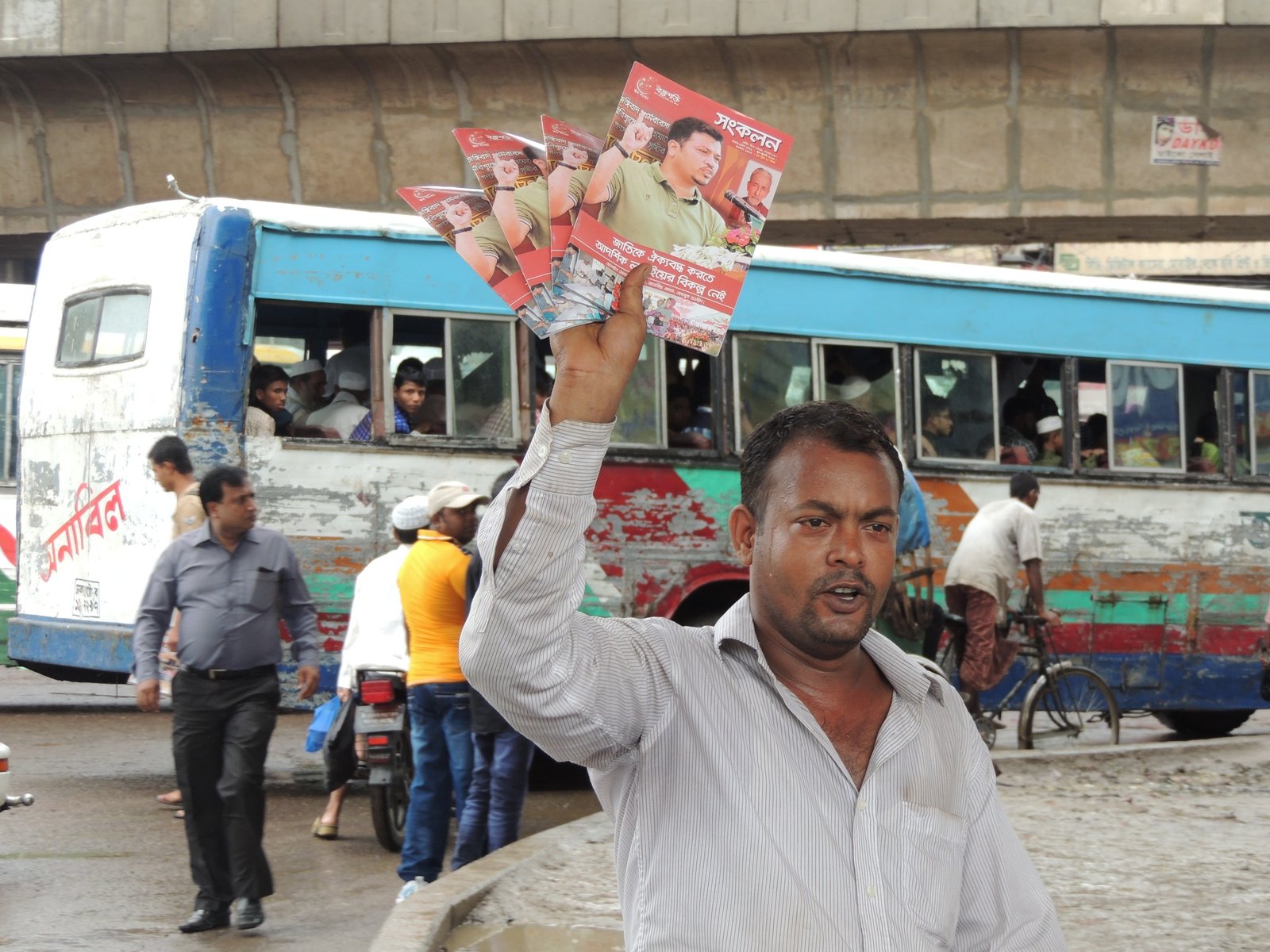
that ideological struggle is essential to unite the nation. Through books, magazines,
newspapers, and other media, Hezbut Tawheed is actively working
to unite humanity against all forms of injustice.
Hezbut Tawheed's Outreach Activities
Hezbut Tawheed undertakes a wide range of outreach activities to highlight the failures of the current global system and present the true essence of Islam as an alternative way of life. These activities include the distribution of handbills, pamphlets, books, and posters, as well as the use of daily newspapers, electronic media, and digital platforms. Hezbut Tawheed is a people-centered organization, committed to raising public awareness through rallies, street meetings, seminars, roundtable discussions, documentary screenings, and cultural events across various regions of the country. Additionally, we organize protest rallies, marches, and press conferences to counter ongoing propaganda and attacks against us.
These events often feature participation from prominent political leaders, academics, poets, writers, cultural
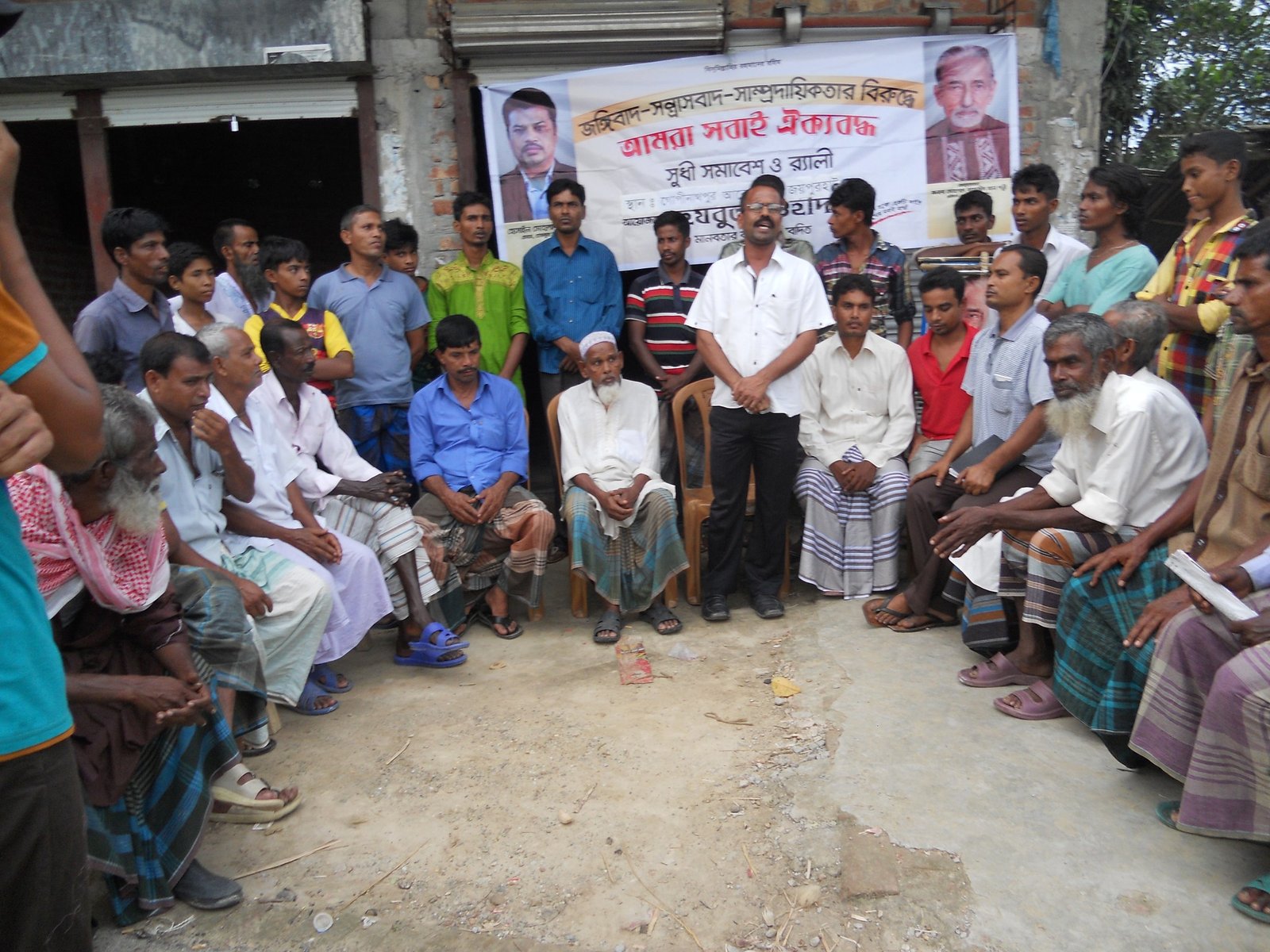
to raise awareness about Islam's stance against religion mongering, extremism, sectarianism,
and dirty politics in the name of Islam. While holding these road meetings, they have faced
attacks from extremists in many places. In the picture, a member of Hezbut Tawheed is speaking
at a meeting held on August 17, 2016, at Gopinathpur Bazaar in Joypurhat district.
figures, journalists, intellectuals, freedom fighters, religious leaders from different faiths, and social activists. The speeches delivered by the Imam of Hezbut Tawheed and other leaders during these events are disseminated through social media and preserved on our website. We conduct these programs in various venues, including government and private auditoriums, press clubs, public libraries, and university halls. We also hold discussions in rural markets or even in people's courtyards. To date, we have organized over 250,000 events nationwide, educating people on Islam's stance against extremism, political corruption, misogynistic fatwas, the misuse of religion, and communalism.
Additionally, our members distribute the movement's books, handbills, newspapers, and magazines in crowded urban and rural areas, as well as on buses, trains, and public water transport. Each year, we set up stalls at book fairs in various districts, including the capital. Our representative teams also visit government offices to meet with officials and inform them about the movement's objectives and activities.

They earn their livelihood through lawful means and contribute a portion of their
hard-earned income to the movement's fund, which covers all the expenses of the movement.
Hezbut Tawheed's Source of Income
At Hezbut Tawheed, we believe that true faith is demonstrated through the sacrifice of both life and wealth for the greater good of humanity. A core principle of our movement is that every active member must be employed in lawful work, refrain from any form of illegal income, and contribute a portion of their earnings to support the movement's activities. The various meetings, seminars, and initiatives we undertake are funded by the sincere contributions of our members, many of whom have limited means but are devoted to the cause of Allah. We do not accept financial contributions from anyone outside the movement.
Propaganda Against Hezbut Tawheed
Hezbut Tawheed is presenting the true teachings of Islam against all forms of injustice, including the misuse
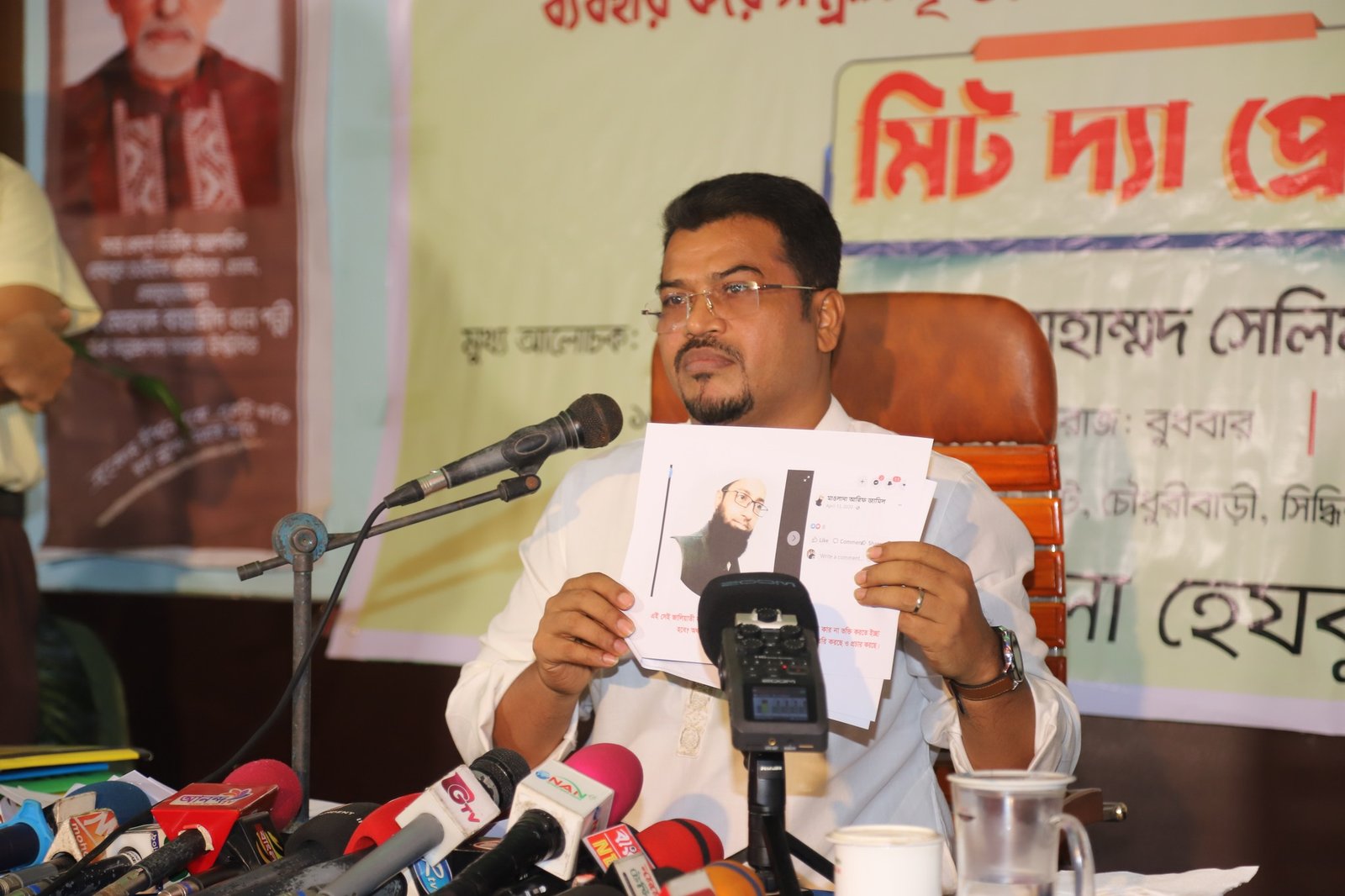
about Hezbut Tawheed. In a press conference in Narayanganj on September 15, 2021,
the Imam of Hezbut Tawheed revealed the extent and nature of these fabrications. To combat such
misinformation, Hezbut Tawheed has had to organize hundreds of similar press conferences.
of religion for political gain, spreading rumors, and attacks on minorities and people of different opinions. Since the establishment of the movement, an extremist and vested interest group has been continuously propagating against us. They are using religious venues such as mosques, madrasas, and religious gatherings to carry out their propaganda. On social media, they are threatening us with death, inciting attacks against us, and spreading rumors. They are engaging in information terrorism by misinterpreting our fragmented statements and spreading edited photos and videos.
On the other hand, Islamophobic groups have also carried out propaganda using Islamophobia against Hezbut Tawheed in various media. They have misled the public and the administration by linking Hezbut Tawheed with various militant banned organizations. Our voice has been silenced by collective propaganda campaign in the style of Von Goebbels. Nevertheless, we have protested against these false campaigns by holding hundreds of press conferences, rallies, and human chains, and we have demanded justice from the relevant government authorities.
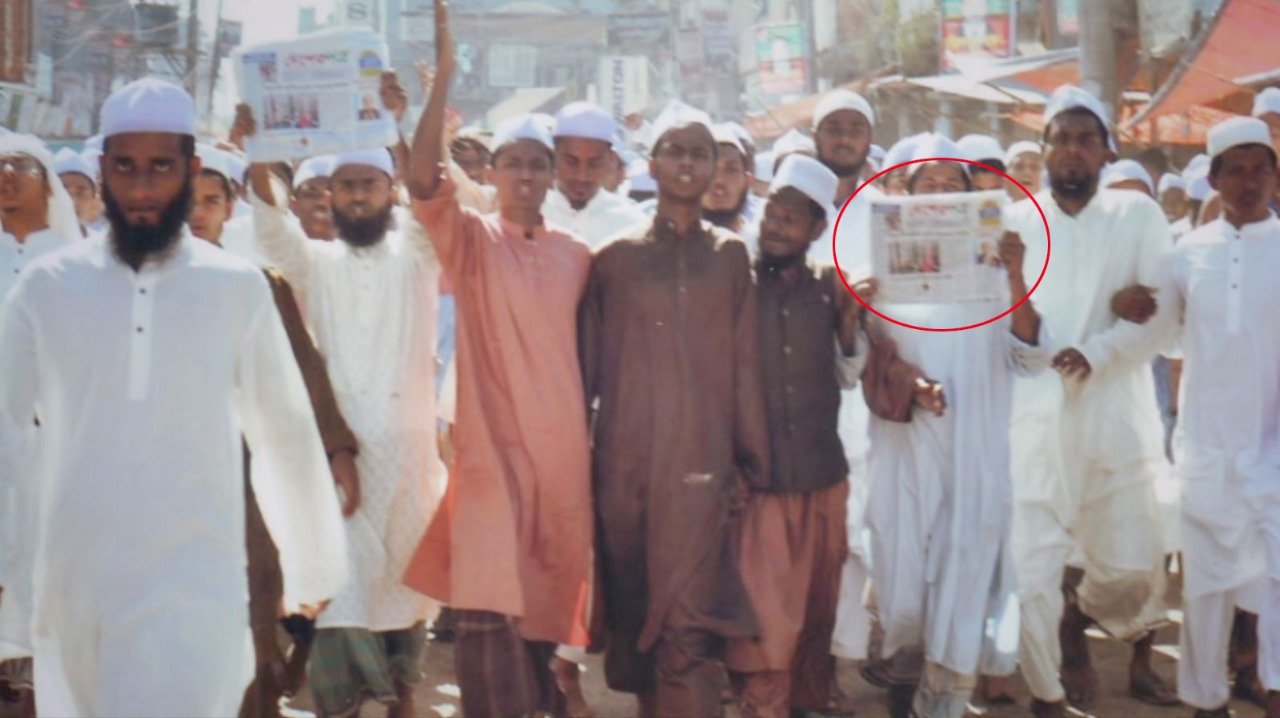
the Daily Desherpatra newspaper in Brahmanbaria
city for publishing the ideology of Hezbut Tawheed.
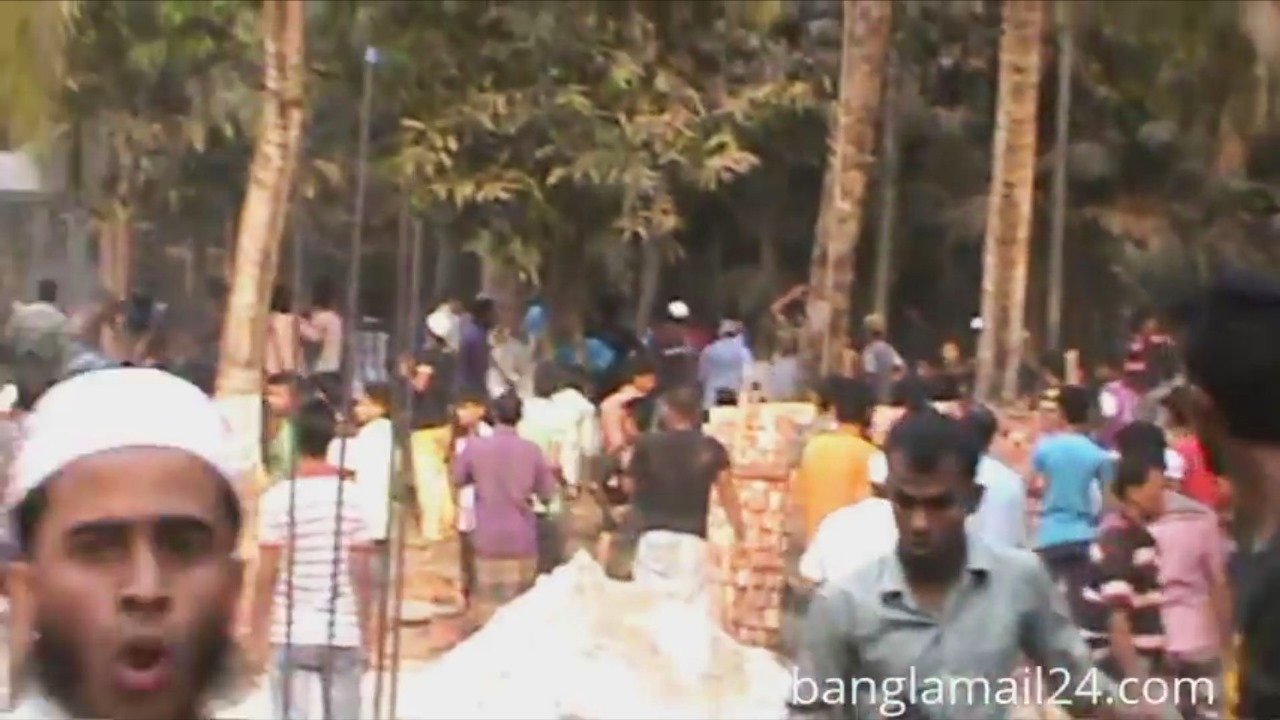
demolishing both his home and the mosque that was under construction in the
courtyard. They then slaughtered two members and attempted to kill 114 others.
History of Persecution Against Hezbut Tawheed
For the past three decades, religious extremist groups and their blind followers have relentlessly spread false propaganda and launched attacks against us. Whenever our members have sought to share the true teachings of Islam through books, pamphlets, or newspapers, these extremist groups have stirred unrest by inciting local people. These frenzied terrorists, often incited by so-called religious scholars, have formed violent mobs that attacked our members, inflicted severe injuries, burned down their homes, and looted their properties. Female members involved in the organization’s outreach efforts have also been assaulted.
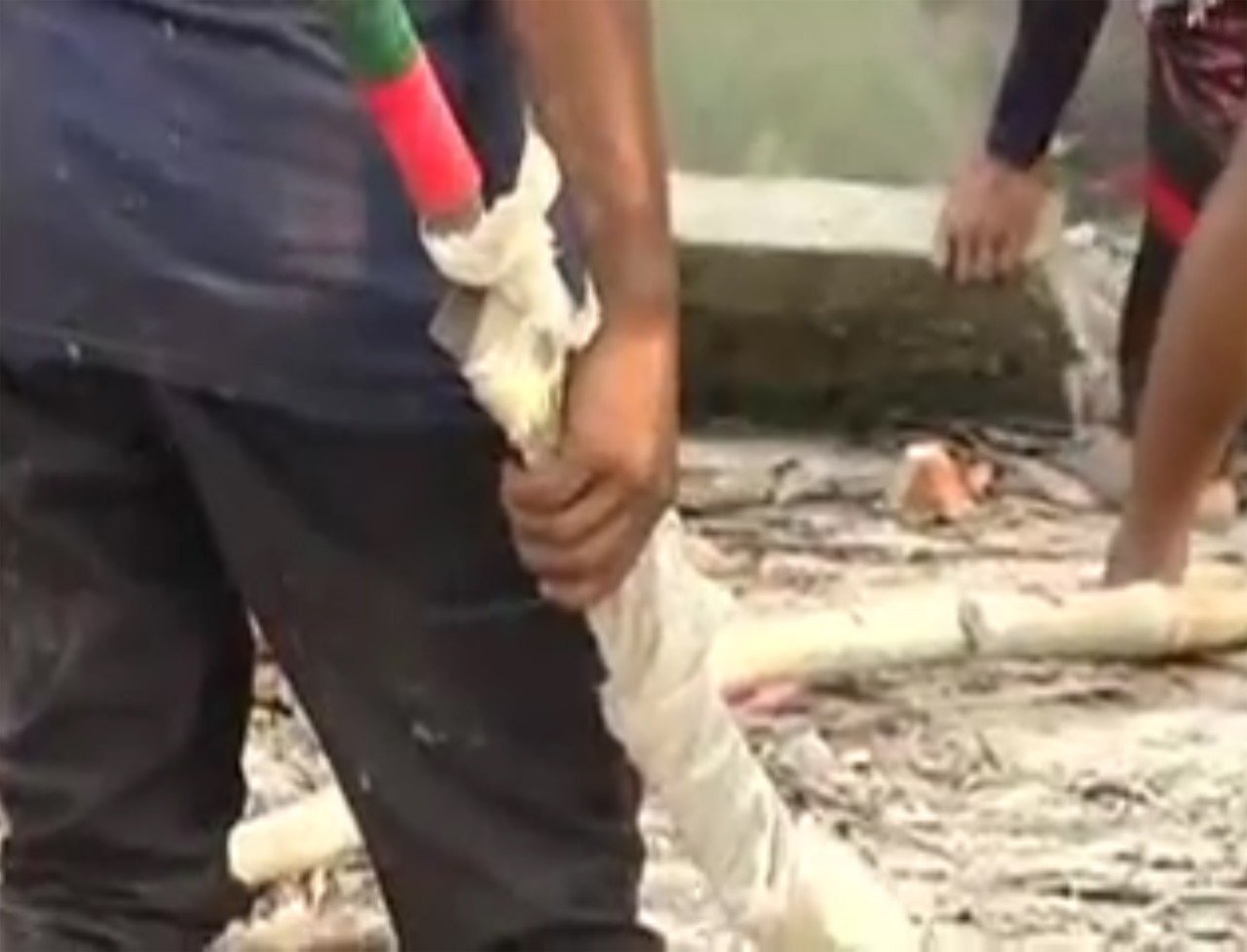
such sharp weapons in Noakhali. Date: 14 March 2016
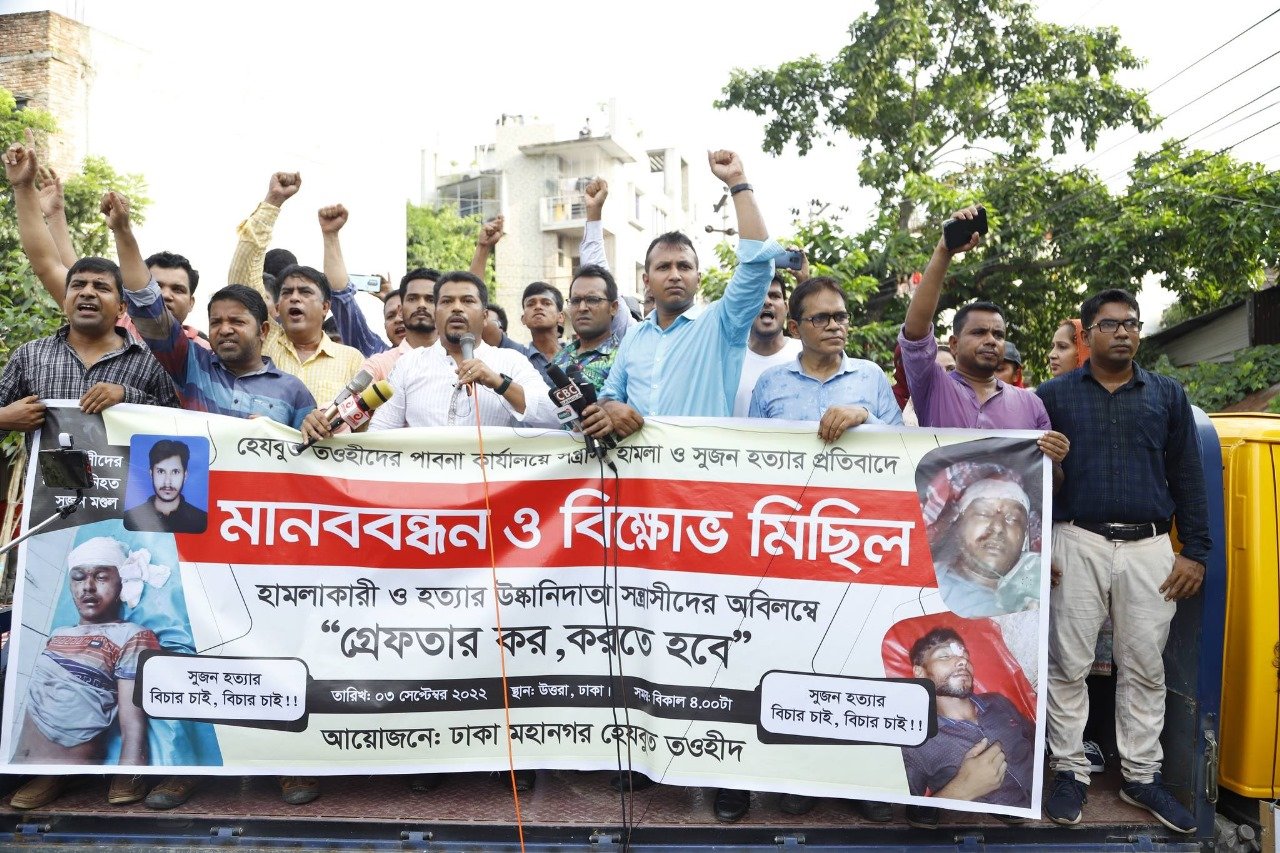
Uttara of Dhaka against the killing of Sujan Mondal, a member
of Hezbut Tawheed in Pabna. Date: 3 September 2022
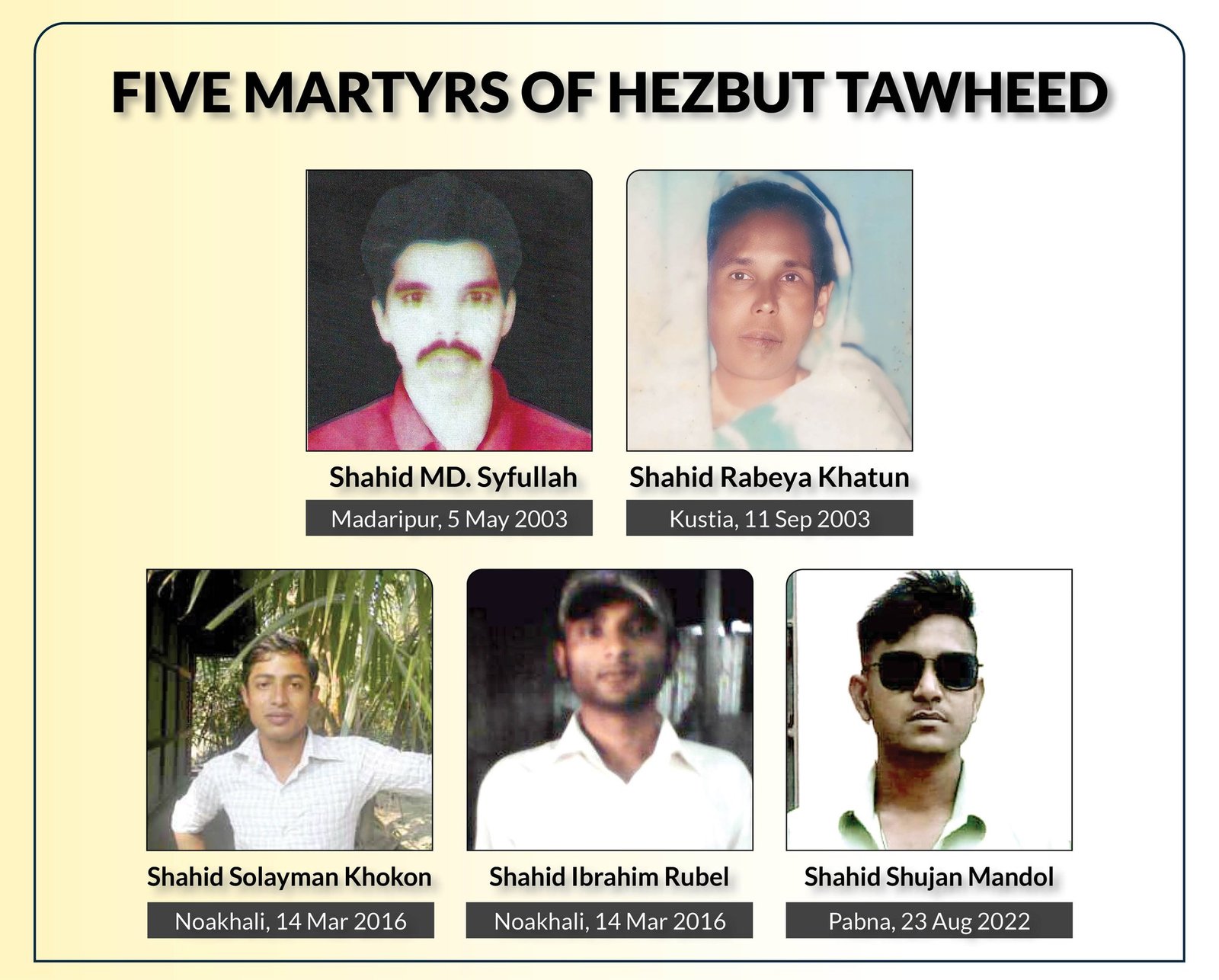
slaughtered five members of Hezbut Tawheed. However, not a single
one of these murders has been properly investigated or prosecuted.
In 2001, they set fire to the ancestral home of the movement's founder, Emamuzzaman Mohammad Bayazeed Khan Panni, at the Karatia Zamindar Palace. In 2003, they beat a member to death in Madaripur and an elderly female member in Kushtia. To date, they have attacked the village home of the movement's leader, Mr. Salim, located in Noakhali district, four times. In 2016, they burned down his and other members' homes and destroyed a mosque under construction. They even slaughtered two members, burning their bodies afterward. In 2022, they hacked a member to death at the Pabna office. Over a thousand such attacks have been carried out against us. However, instead of resorting to violence, we sought help from law enforcement authorities, we did not get justice for even one attack or murder.
Development Activities of Hezbut Tawheed
We are dedicated to building a peaceful and progressive global civilization. To create a tangible example of this vision, our Honorable Imam has chosen his own village as a model. Just five years ago, it was one of the most underdeveloped, impoverished, and educationally deprived villages in the country, plagued by drug trafficking, extortion by political thugs, and daily violence. However, in a remarkably short time, this village has been transformed into a thriving, modern community. Under the visionary leadership of the Imam of Hezbut Tawheed, members of the movement have worked tirelessly, day and night, to turn this ideology into reality. They have poured their resources and skills into establishing over fifty development projects, which have continuously improved the quality of life for local residents.
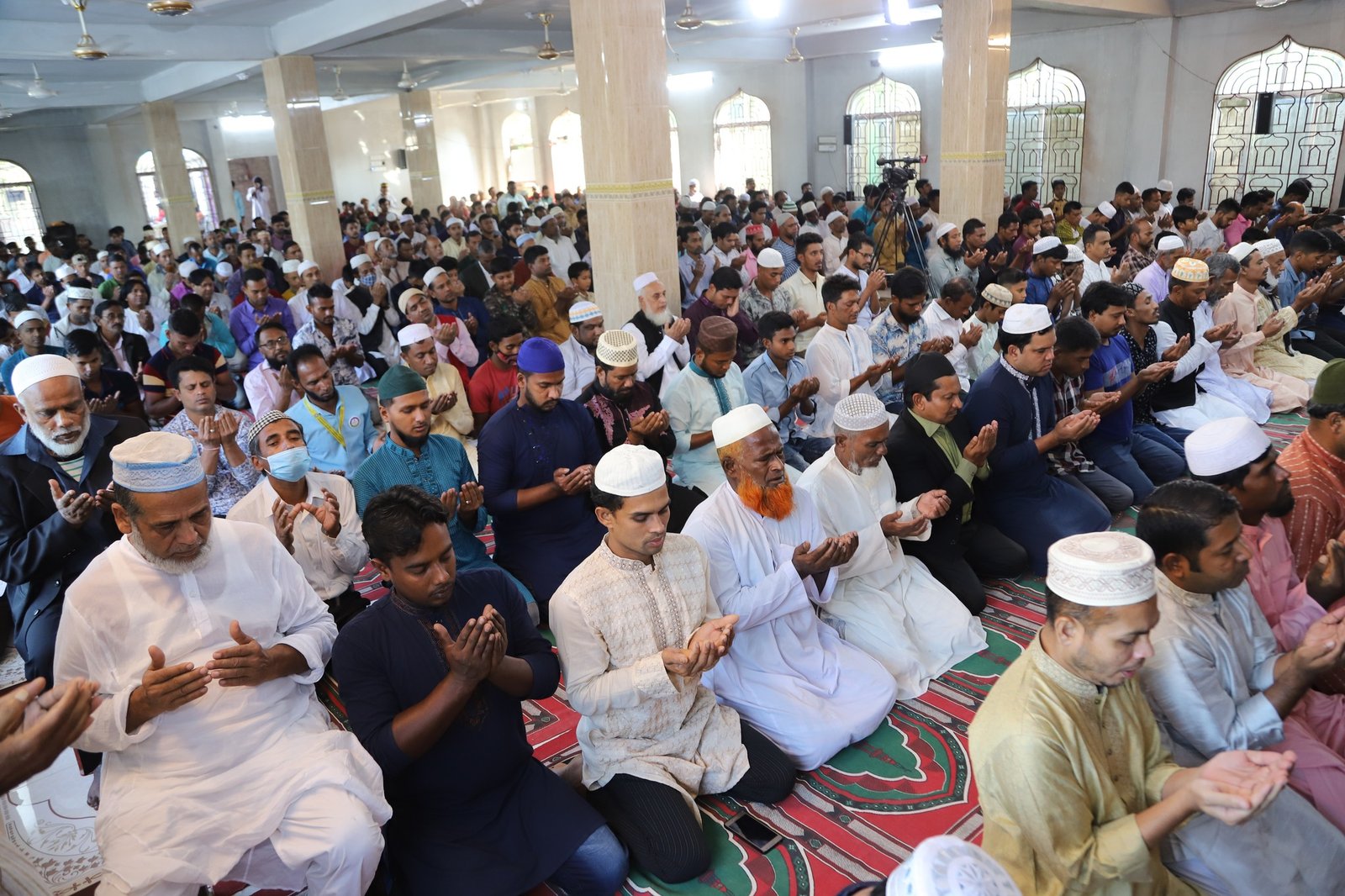
leading to the deaths of two Hezbut Tawheed members. Unshaken, the community
rebuilt the mosque into a striking four-story structure that now hosts thousands of
worshippers. This tale underscores Hezbut Tawheed’s remarkable resilience and steadfast
commitment amid adversity and fanaticism.
(1) The Mosque as a Religious and Social Center: A four-story mosque has been established as a center for the true teachings and culture of Islam. In 2016, it was destroyed by extremists, and two of our members were killed. Today, it stands robust, attracting thousands of worshippers each Friday. The mosque houses an elementary Quranic school (maktab), a public education initiative, and a library. Unlike many mosques in Bangladesh, it welcomes women to participate in all activities. The mosque also hosts weddings, social events, and uses its conference room for various meetings. After Friday prayers, the Honorable Imam addresses and supports his followers with personal guidance.
(2) Promoting a Balanced Educational System: Recognizing the flaws in the conventional education system,
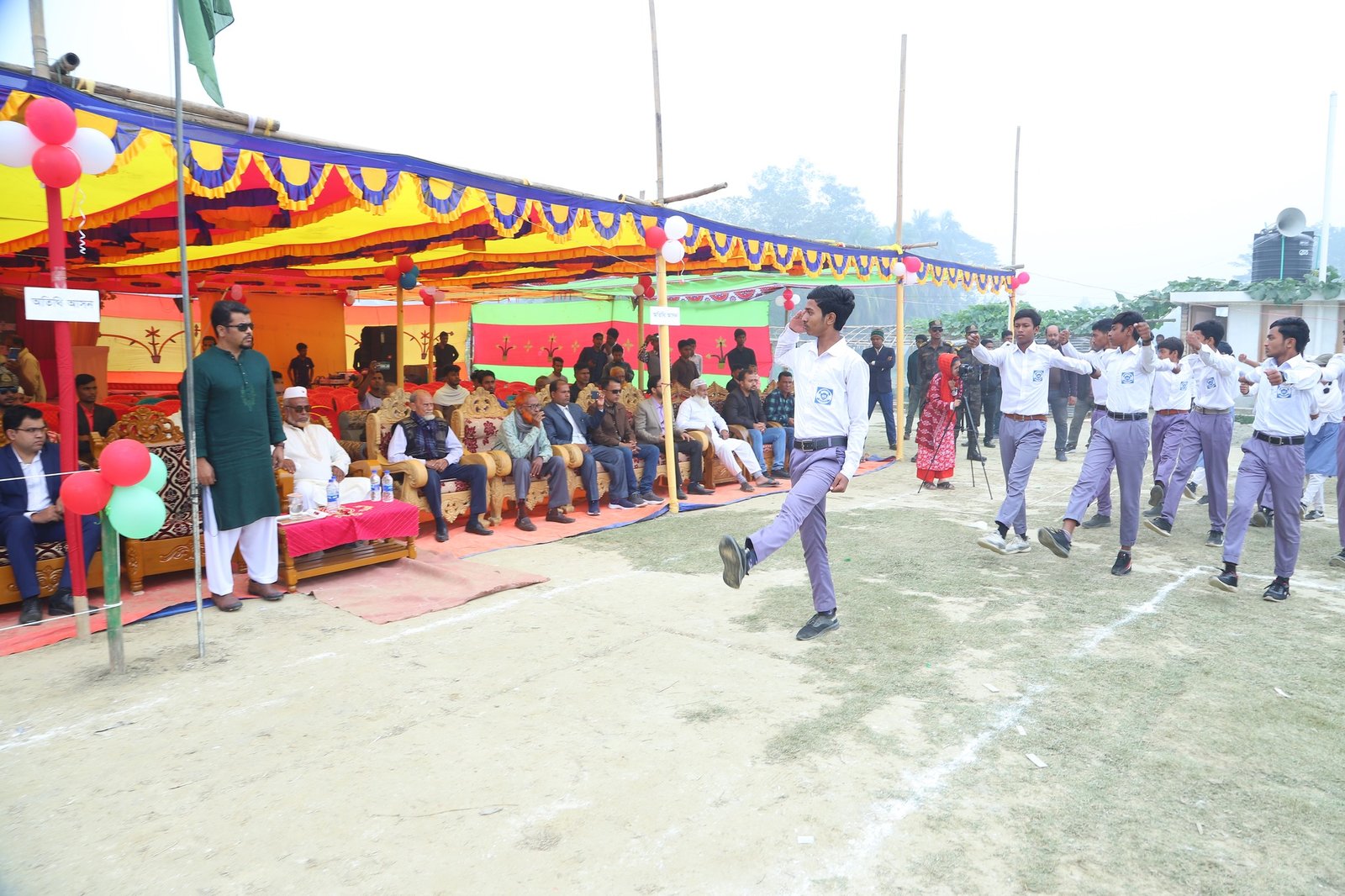
learning. To bring this vision to life, they have established a school. On December 16, 2022,
the Imam of Hezbut Tawheed and distinguished guests attended a student parade
at Chashirhat Nurul Haque High School in Noakhali, celebrating Victory Day.
Hezbut Tawheed has introduced a balanced educational model to cultivate a nation rich in practical knowledge and moral integrity. To realize this vision, we established a school in the village. Our young teaching faculty not only covers the standard curriculum but also instills values such as unity, discipline, patriotism, honesty, and dedication in the students. Through this approach, we aim to develop well-rounded individuals equipped with both academic knowledge and strong ethical principles.
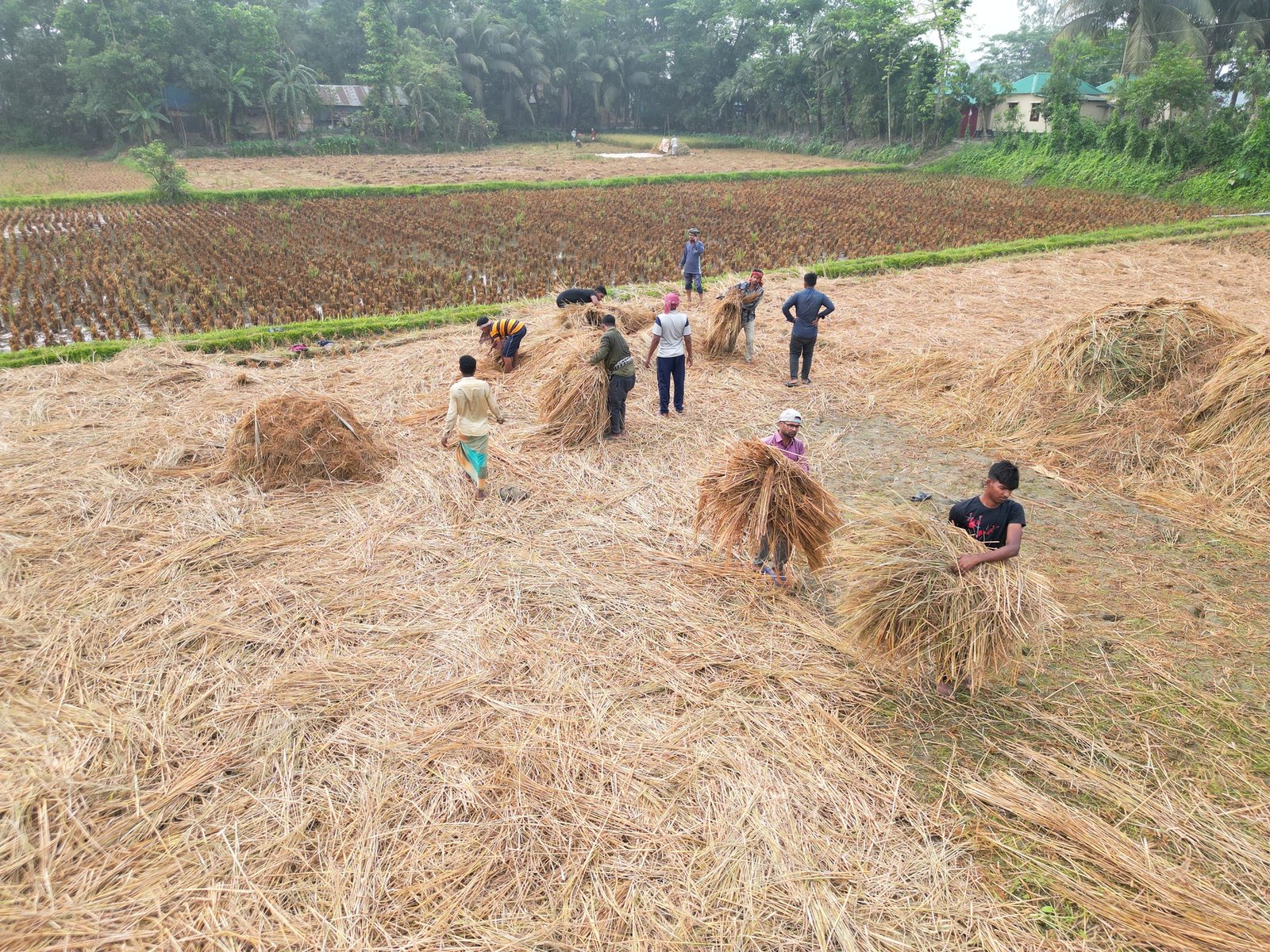
In response, the Imam of Hezbut Tawheed called for an agrarian revolution during the
Covid pandemic to prevent famine. Hezbut Tawheed members are actively growing their
own food crops and vegetables to achieve self-sufficiency. On April 19, 2023, they were
seen harvesting paddy in Noakhali, demonstrating their commitment to addressing the food shortage.
(3) Agricultural Project: When the COVID-19 pandemic struck in 2020, Bangladesh implemented a lockdown that halted all economic activities, including production, business, and agriculture. In response, the Imam of Hezbut Tawheed initiated agriculture-based projects across the country to ensure food security. Today, these projects cultivate a range of crops such as rice, corn, potatoes, and wheat, as well as various fruits and vegetables. They have also created employment opportunities for hundreds of people.
(4) Cattle Fattening Project: To meet the growing demand for dairy and meat
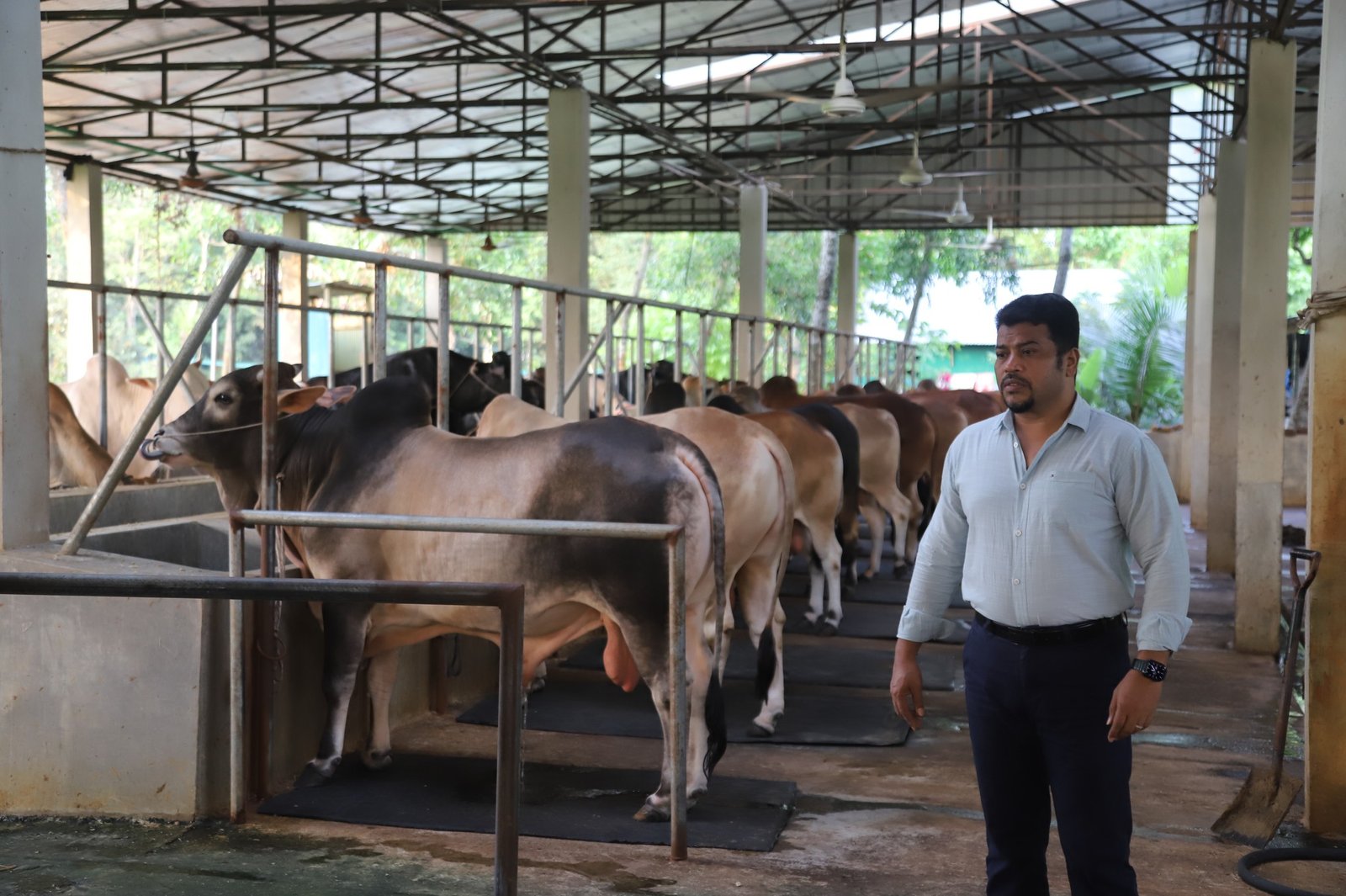
the Imam of Hezbut Tawheed visited one of these farms, where cows are raised organically
without steroids. The farm has the capacity to fatten up to five hundred cows annually.
protein, we have established three cattle farms in Chashirhat. Each year, over five hundred cows are organically raised and sold. We grow high-quality grass on nearly 20 acres and produce nutritious feed in our mill. By avoiding steroid hormones, we ensure that the meat remains healthy and nutritious.
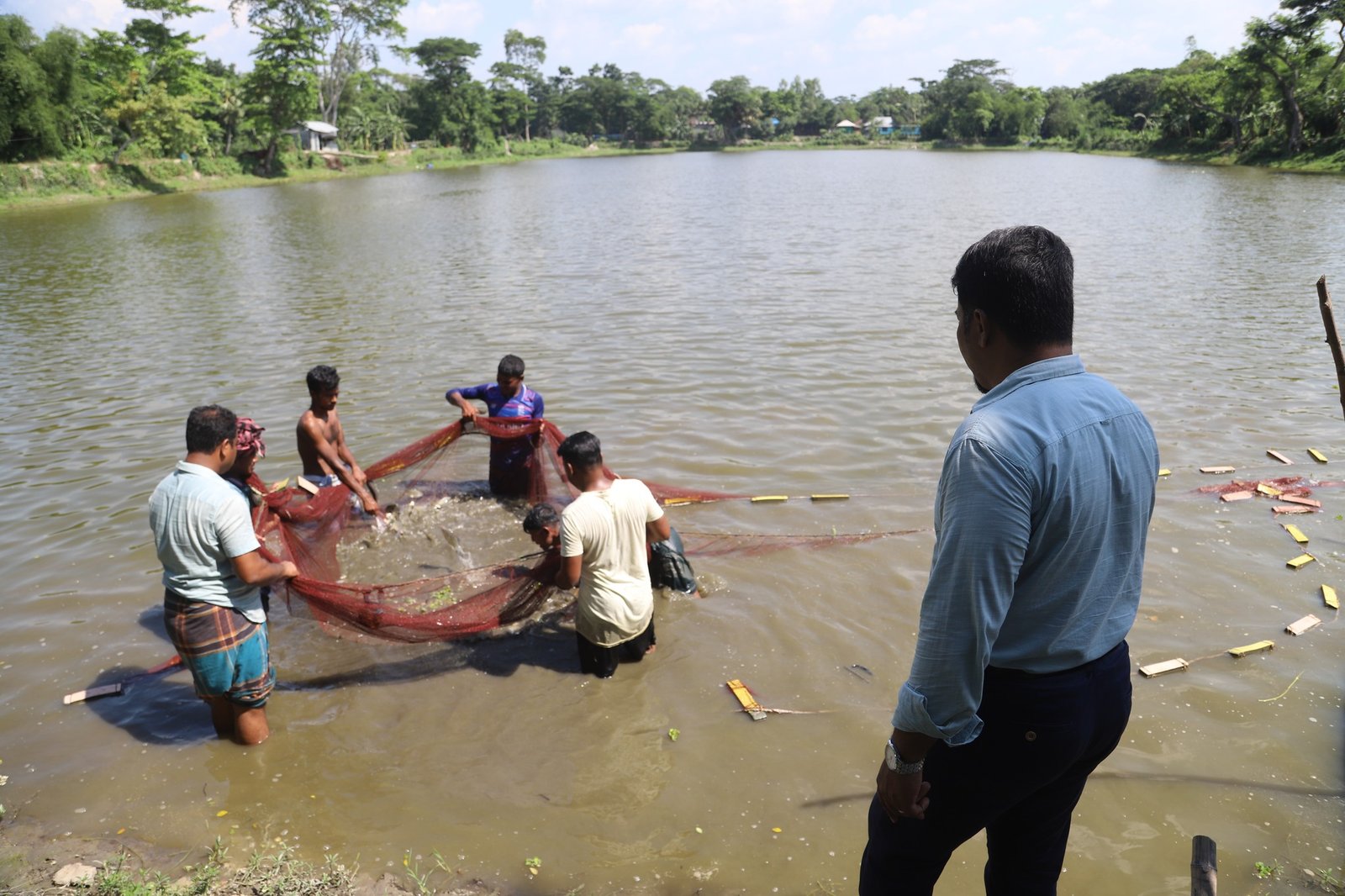
village ponds. The project also features a hatchery for fish breeding and has earned government
recognition. On May 25, 2024, the Imam of Hezbut Tawheed visited this major project.
(5) Fish Farming Project: Under the initiative of Hezbut Tawheed, a 20-acre fish farm has been established by converting unused village ponds for fish farming. These farms produce thousands of tons of fish every 3-4 months. Additionally, nine newly excavated ponds yield at least two tons of fish daily. The project also includes a hatchery for fish breeding, which has already been recognized with an award from the government’s Fisheries Department.
(6) Garment Industry Factory: Hezbut Tawheed has established a garment factory
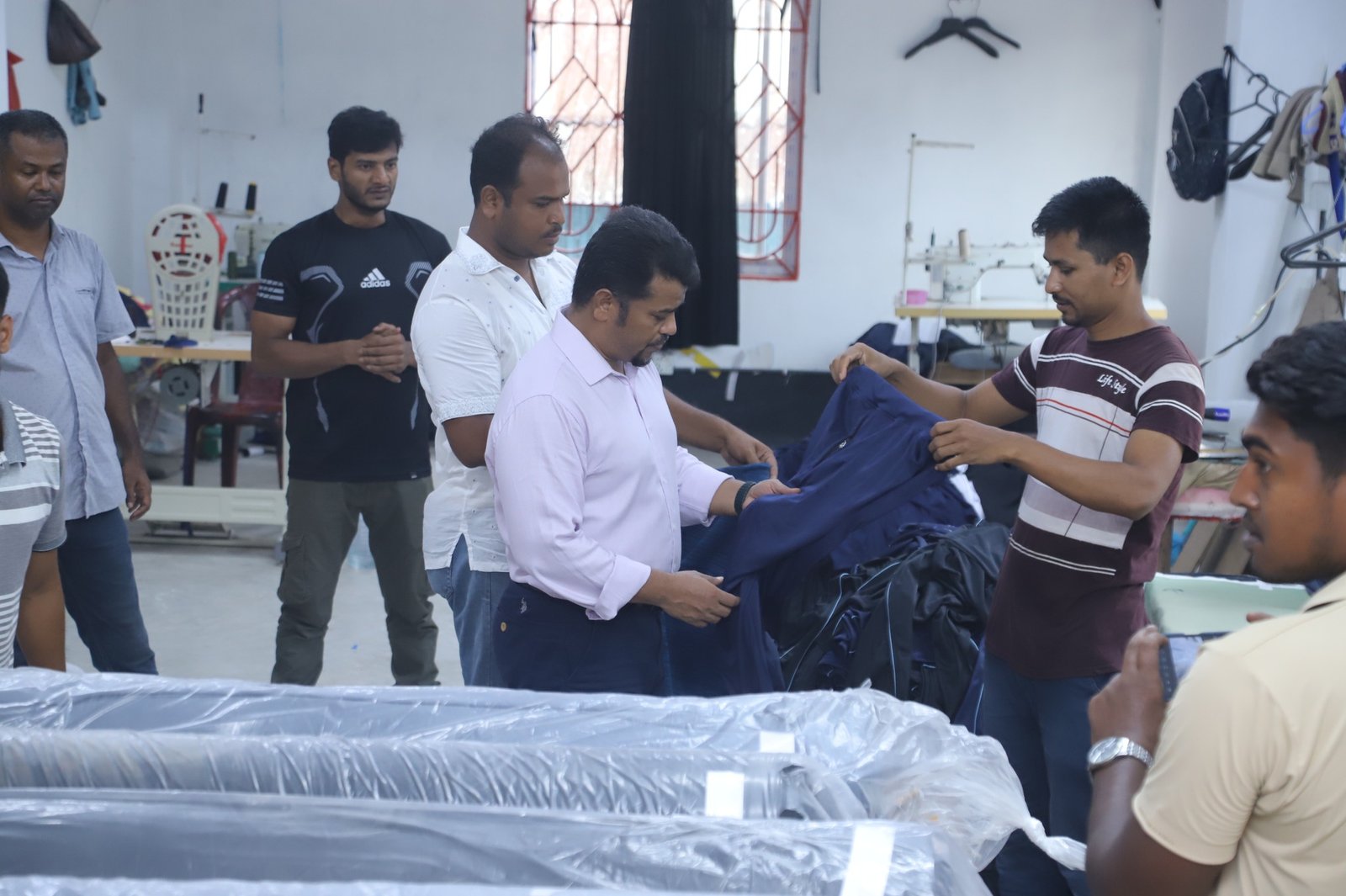
a garment factory in Chashirhat Village, Noakhali, providing jobs for around 250 people.
On May 22, 2024, the honorable Imam of Hezbut Tawheed, Mr. Hossain Mohammad Salim, visited the factory.
named "KR Fashions" here. The factory produces a range of items, including children's clothing, garments for all ages, and mosquito nets. More than 250 men and women are employed in this project. Every Eid, the Imam of Hezbut Tawheed gifts clothes made by this factory to the villagers.

marketing center featured at the Chashirhat Trade Fair 2024.
https://www.facebook.com/hezbutta.../videos/1106859727012619
(7) Food Processing Industry: A food processing and essential goods company, "Karrani Foods Private Limited," has been established here. The company produces and markets a variety of products, including pure mustard oil, chanachur, spiced puffed rice, roasted peas, lentil fritters, red flour, ground turmeric, chili, coriander, cumin, beauty soap, laundry soap, detergent powder, handwash, dish cleaner, mosquito coils, and more.
(8) Hospital: To provide advanced healthcare to the underdeveloped village, a modern
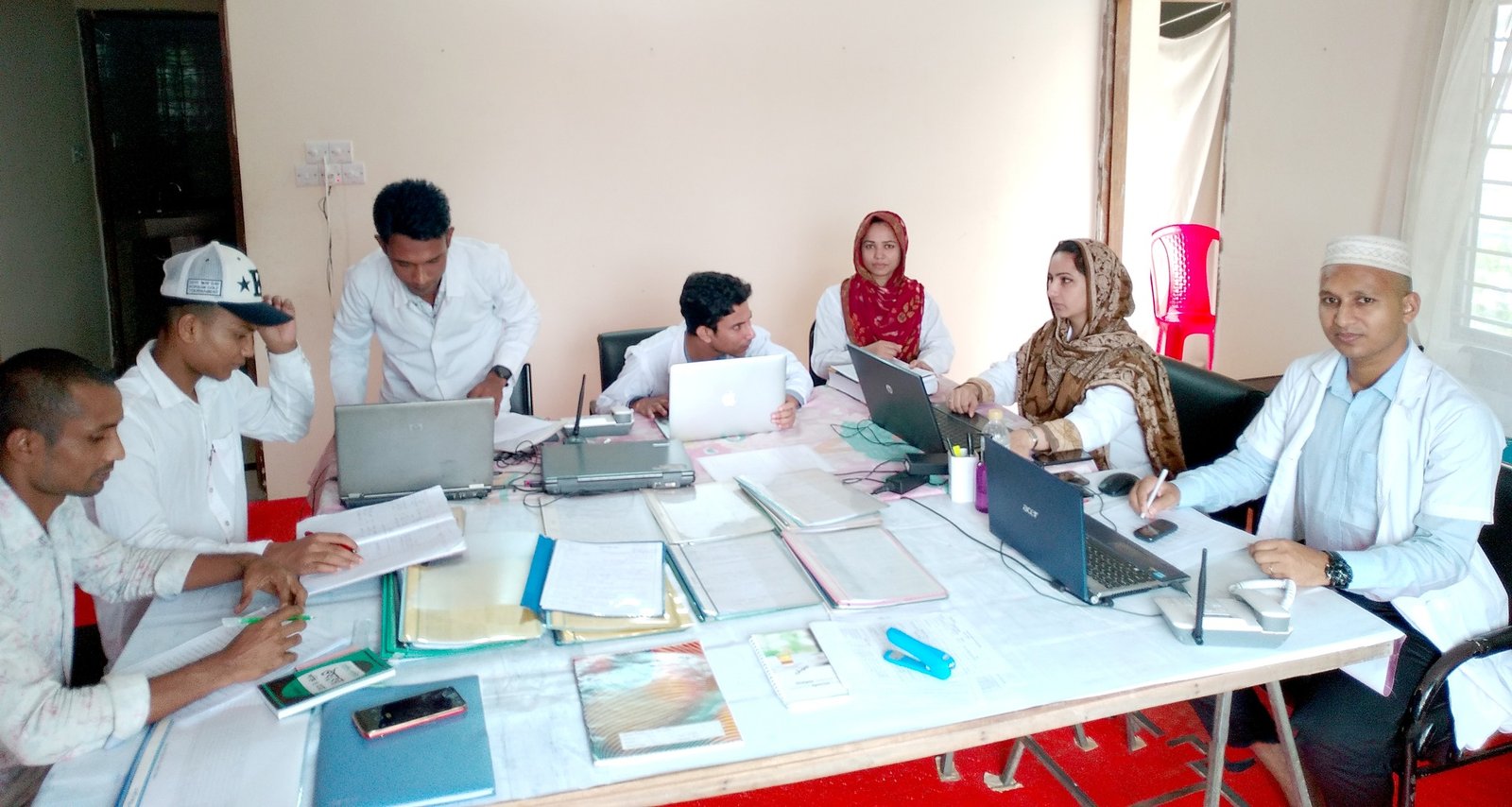
pandemic using homeopathy. Regional members across the country
were actively involved in emergency drug supply and medical services.
homeopathic clinic has been established. This clinic has successfully treated nearly two hundred patients with COVID-19 during the pandemic. Construction of a large hospital is also underway.
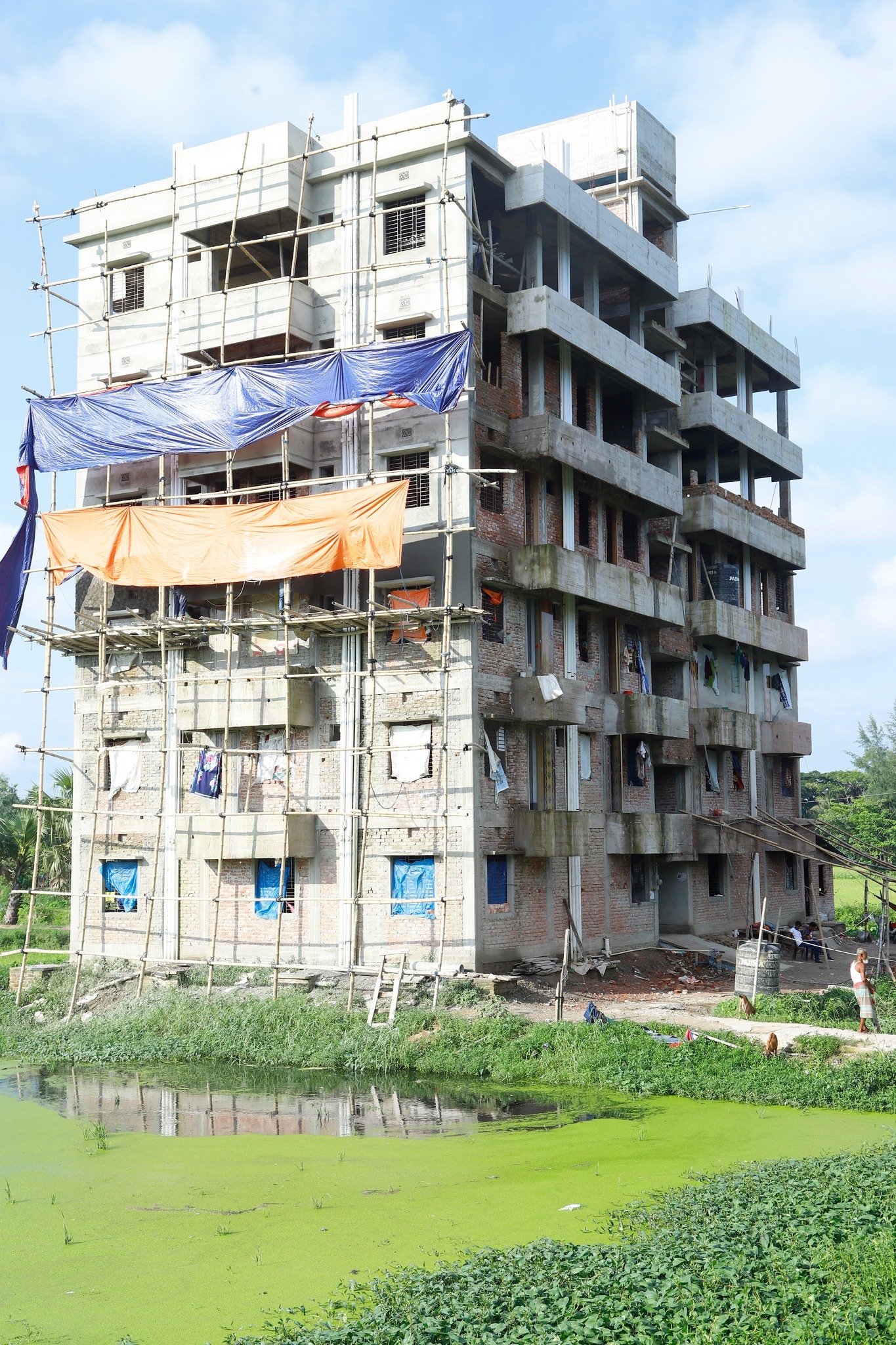
established by Hezbut Tawheed have been provided
with housing for their accommodation.
(9) Housing Project: Land acquisition, landfilling, and building construction are underway to provide housing for workers in the Chashirhat Development Project. The housing project, “Member Colony,” currently accommodates 50 families.
(10) Small Business Project: To empower unemployed youths, over fifty small businesses have been established here.
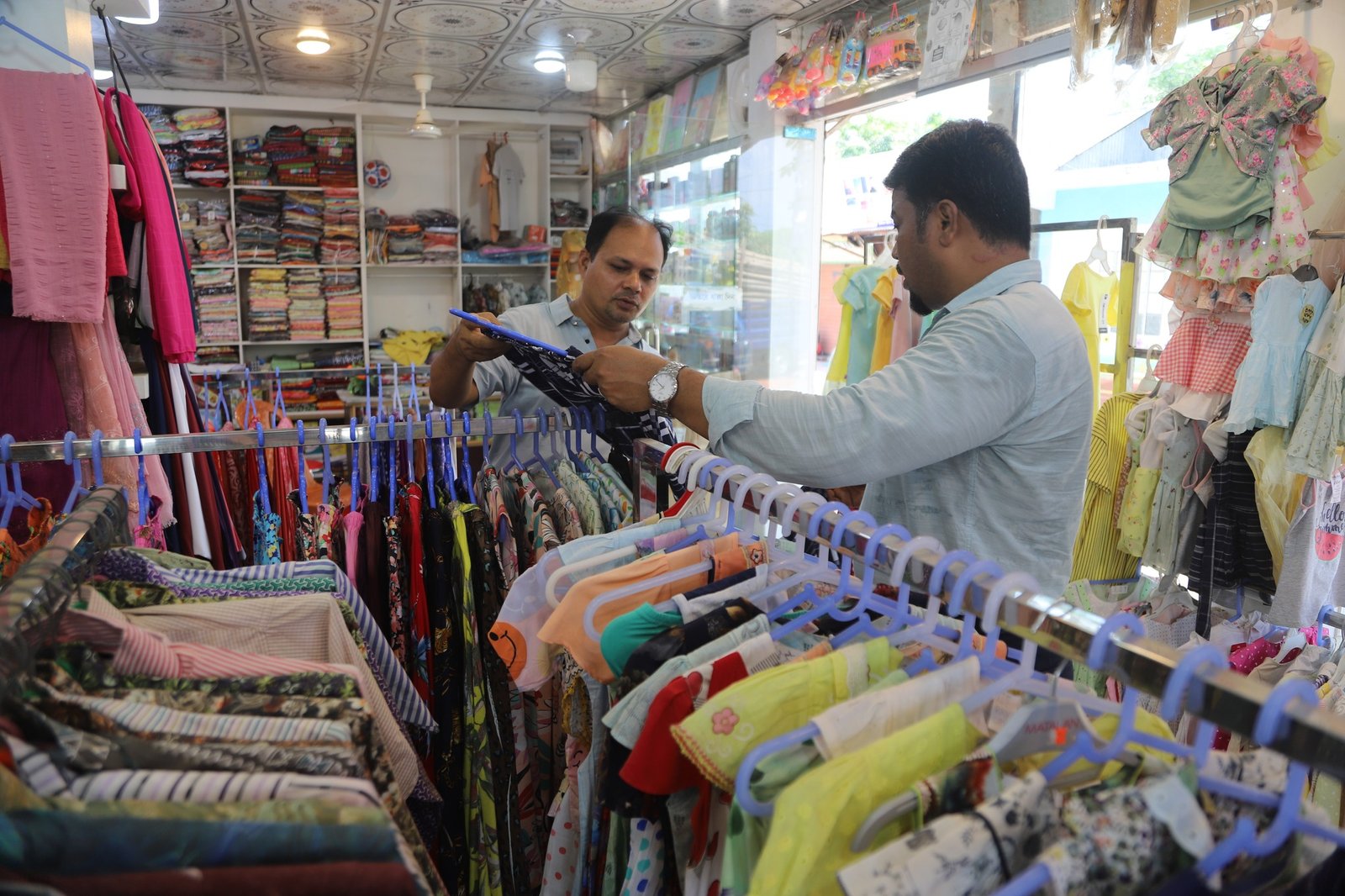
in a remote rural area, bringing modernity to the region. On May 25, 2024,
the Imam of Hezbut Tawheed visited the showroom.
Despite significant challenges, such as severe shortages of water, electricity, transportation, communication infrastructure, and skilled labor in this remote rural area, Hezbut Tawheed is successfully advancing these enterprises.
(11) Trade Fair: Every year, a week-long trade fair is held on the school grounds, showcasing and selling products from our projects. The fair features a diverse range of items,
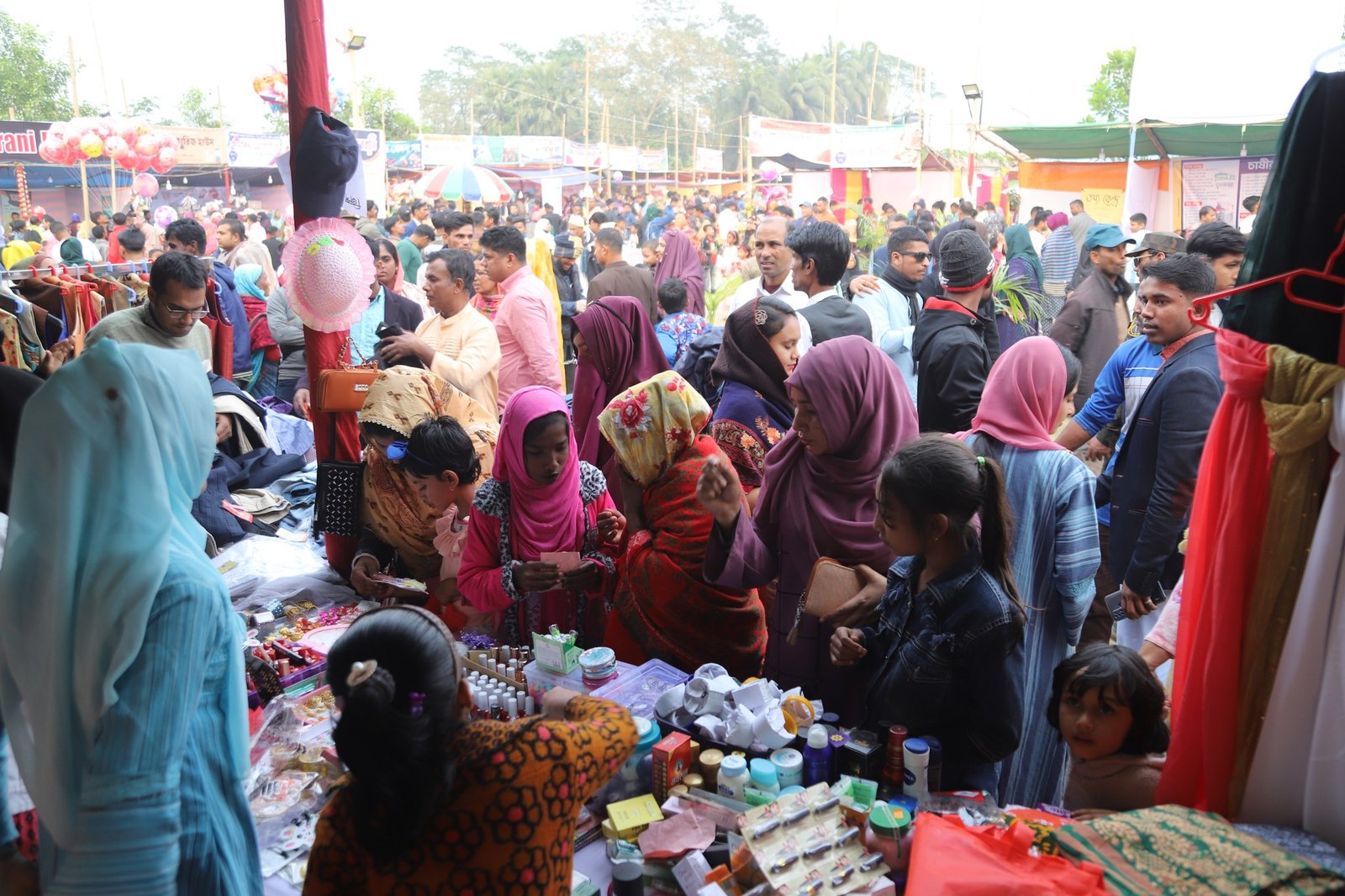
Noakhali. Now a local festival, it draws a large crowd and showcases
a variety of traditional products from different districts, including
organic items, toys, fashion, furniture, and village pithas.
The evening cultural program features songs, traditional dance, and drama.
https://www.facebook.com/hezbutta.../videos/1106859727012619
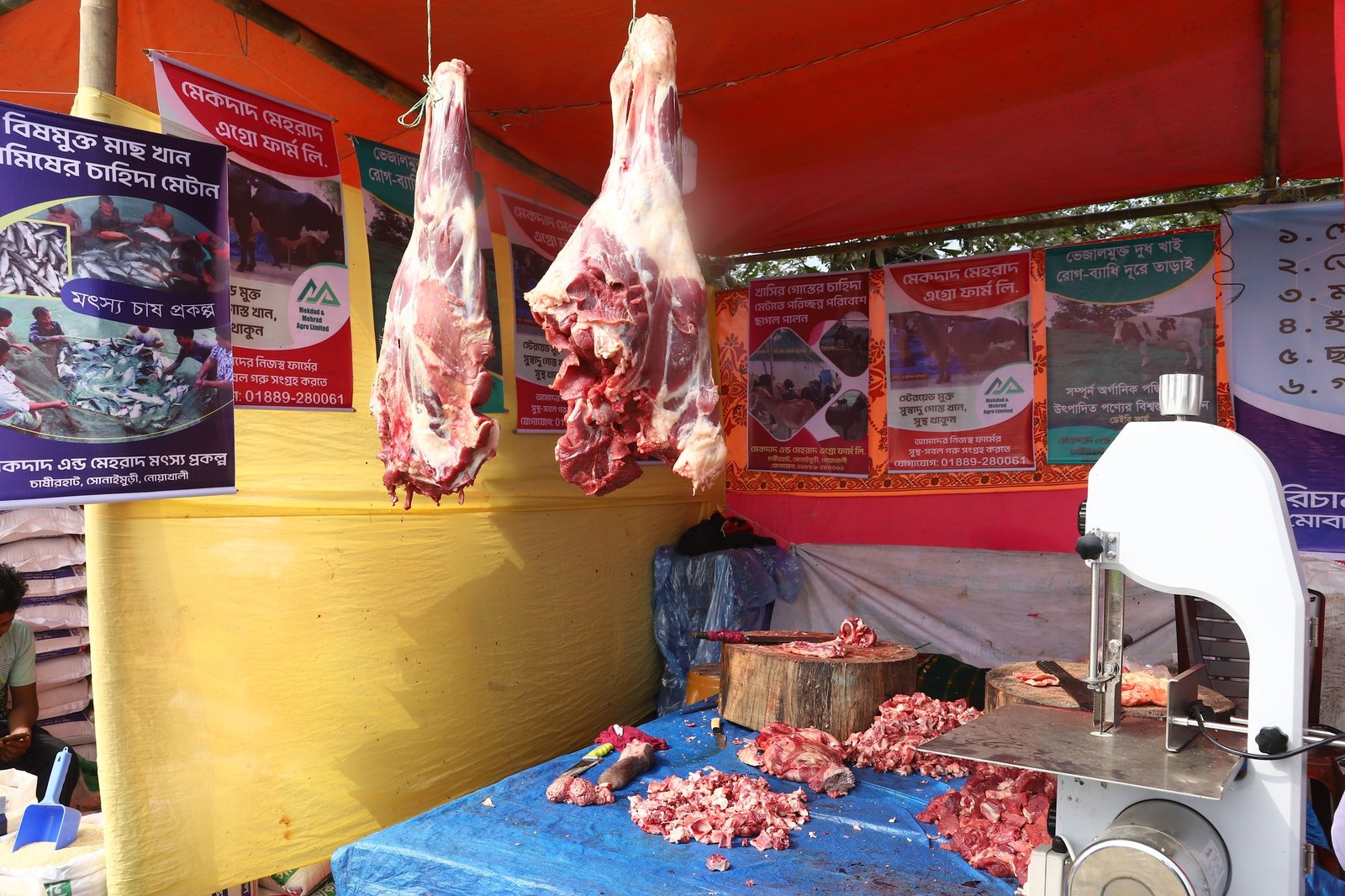
offers meat processed with automatic machines.
The beef is healthy and tasty due to its organic farming,
and it has become very popular.
https://www.facebook.com/hezbutta.../videos/1106859727012619
including children's toys, beef, goat meat, fish, vegetables, clothing, crockery, furniture, food, handicrafts, heritage items, and other daily necessities. Thousands of visitors from distant areas attend the fair, impressed by its impeccable organization, festive atmosphere, robust security, and overall management.
